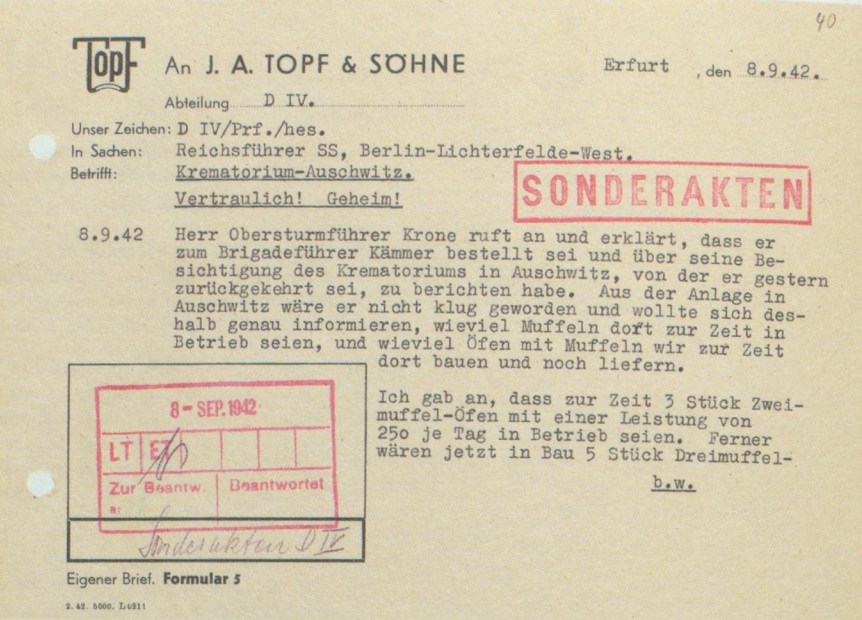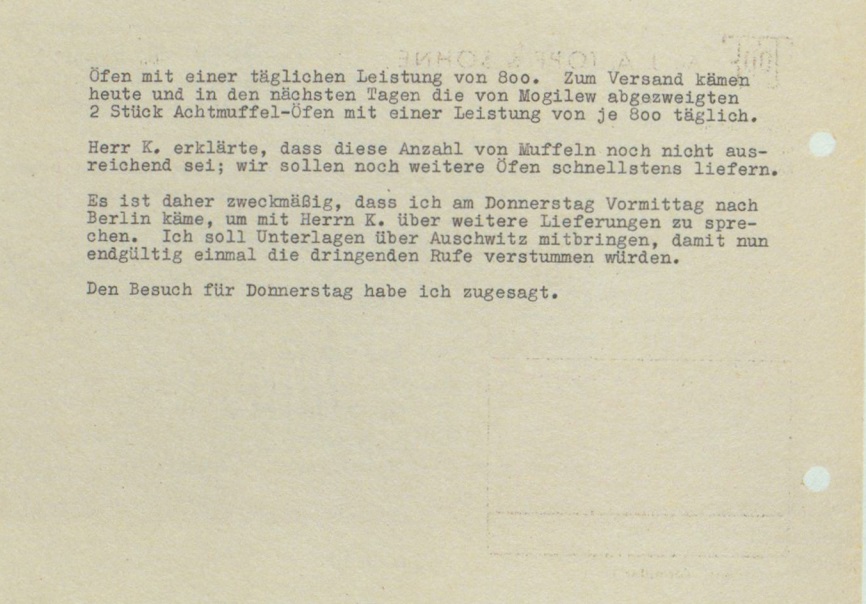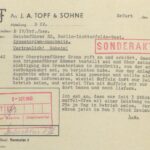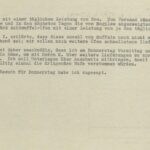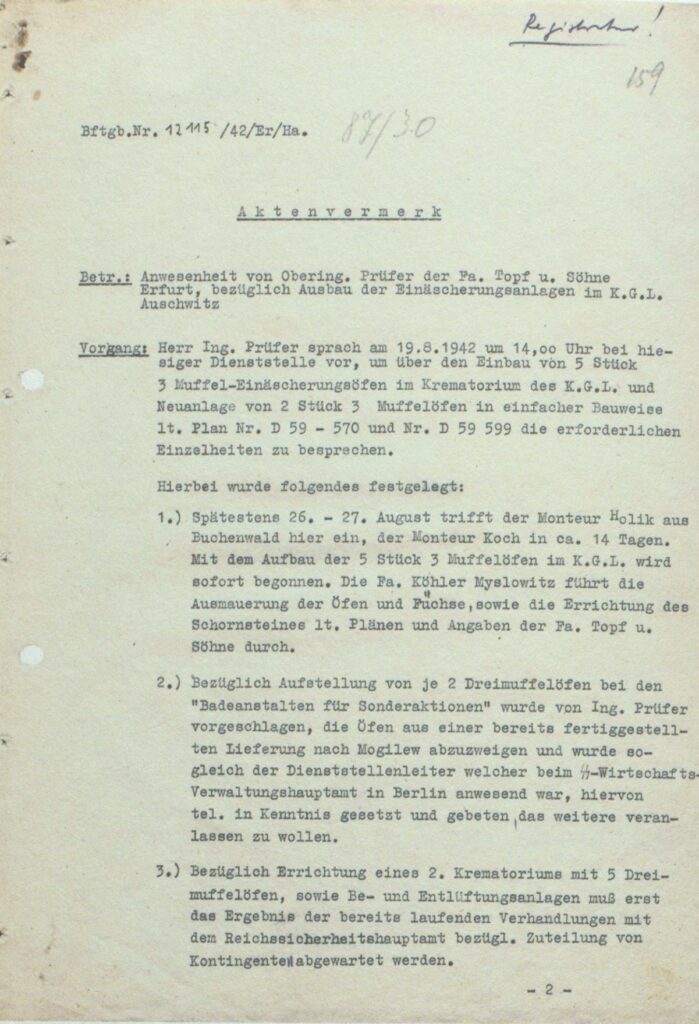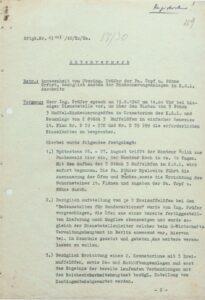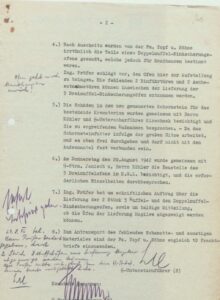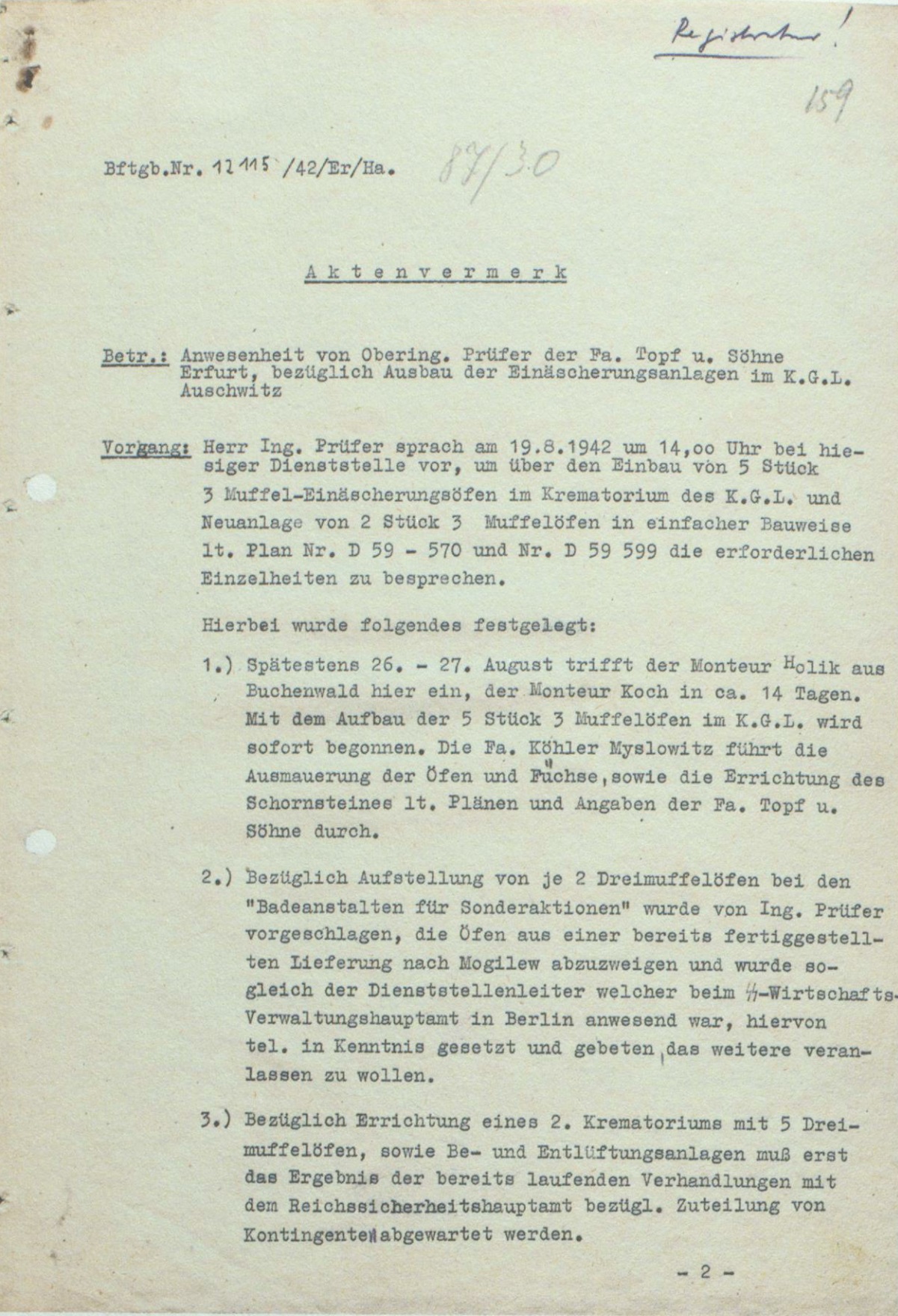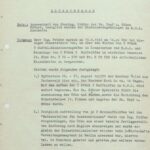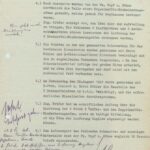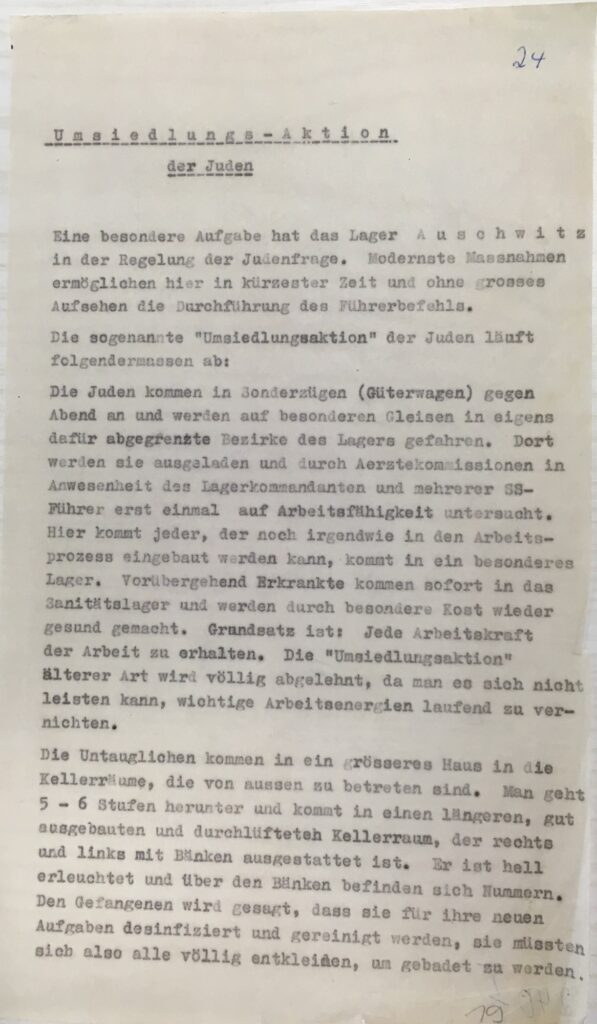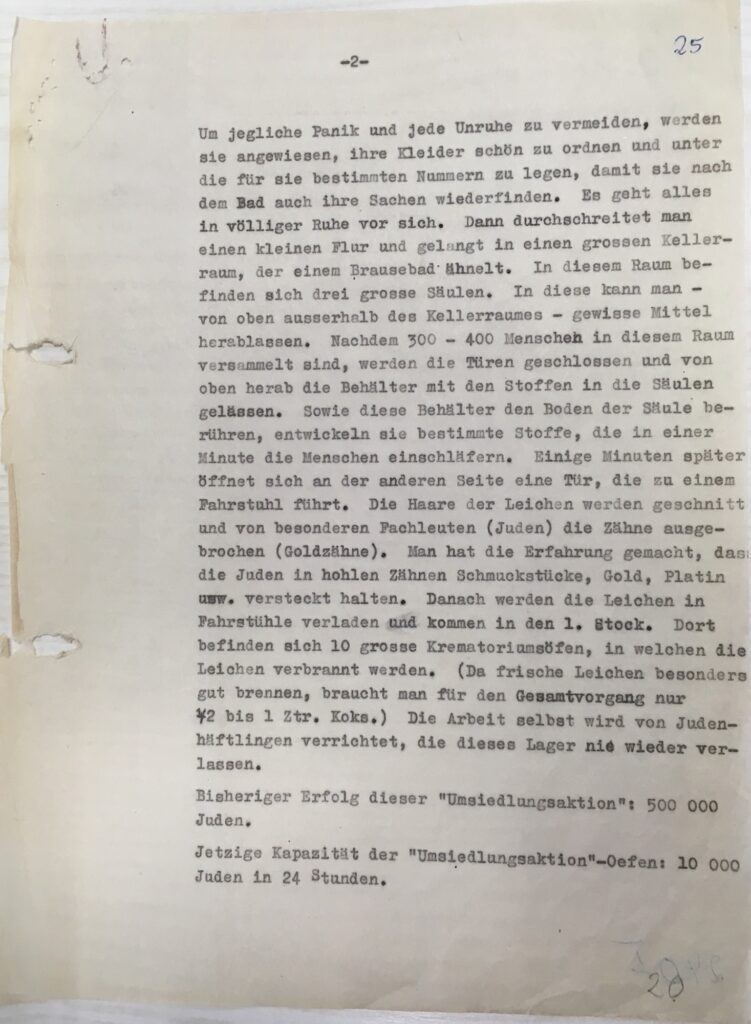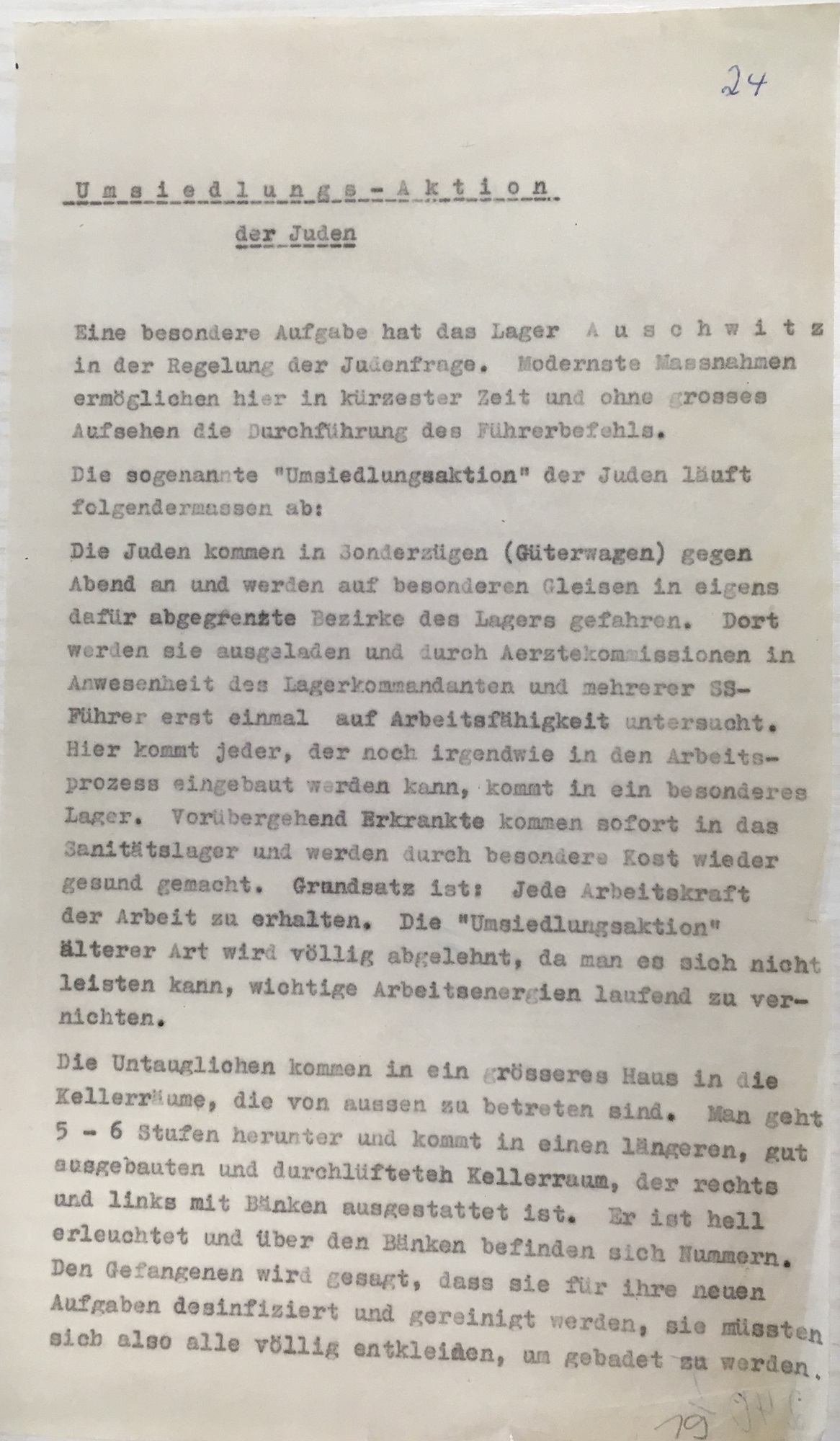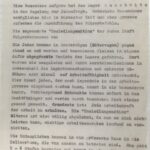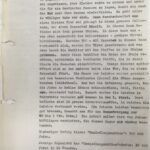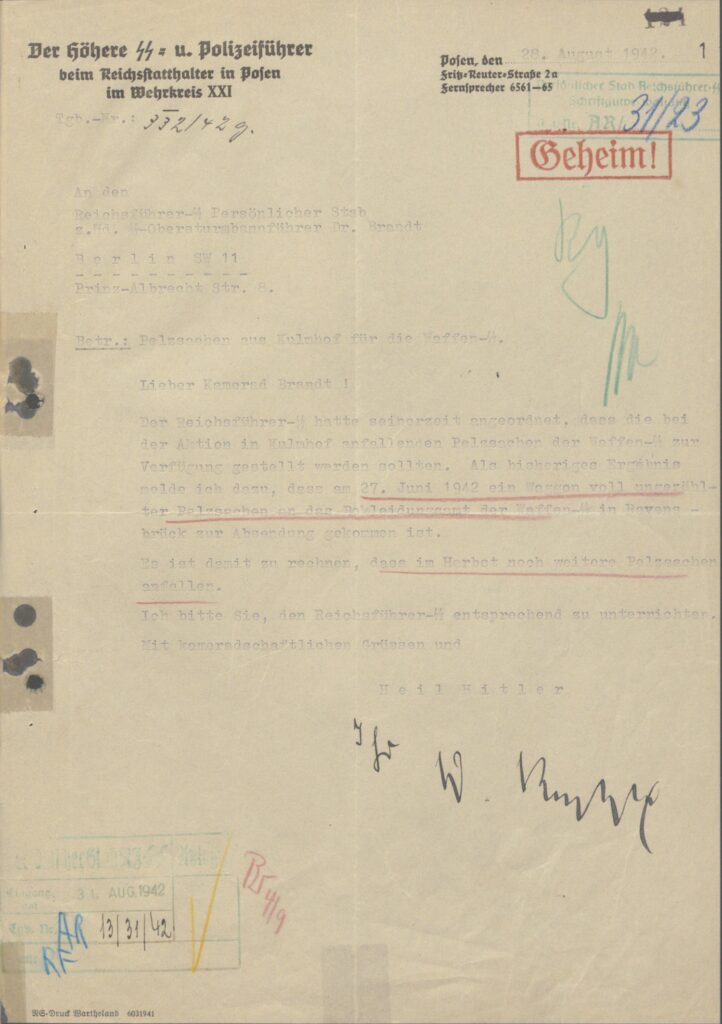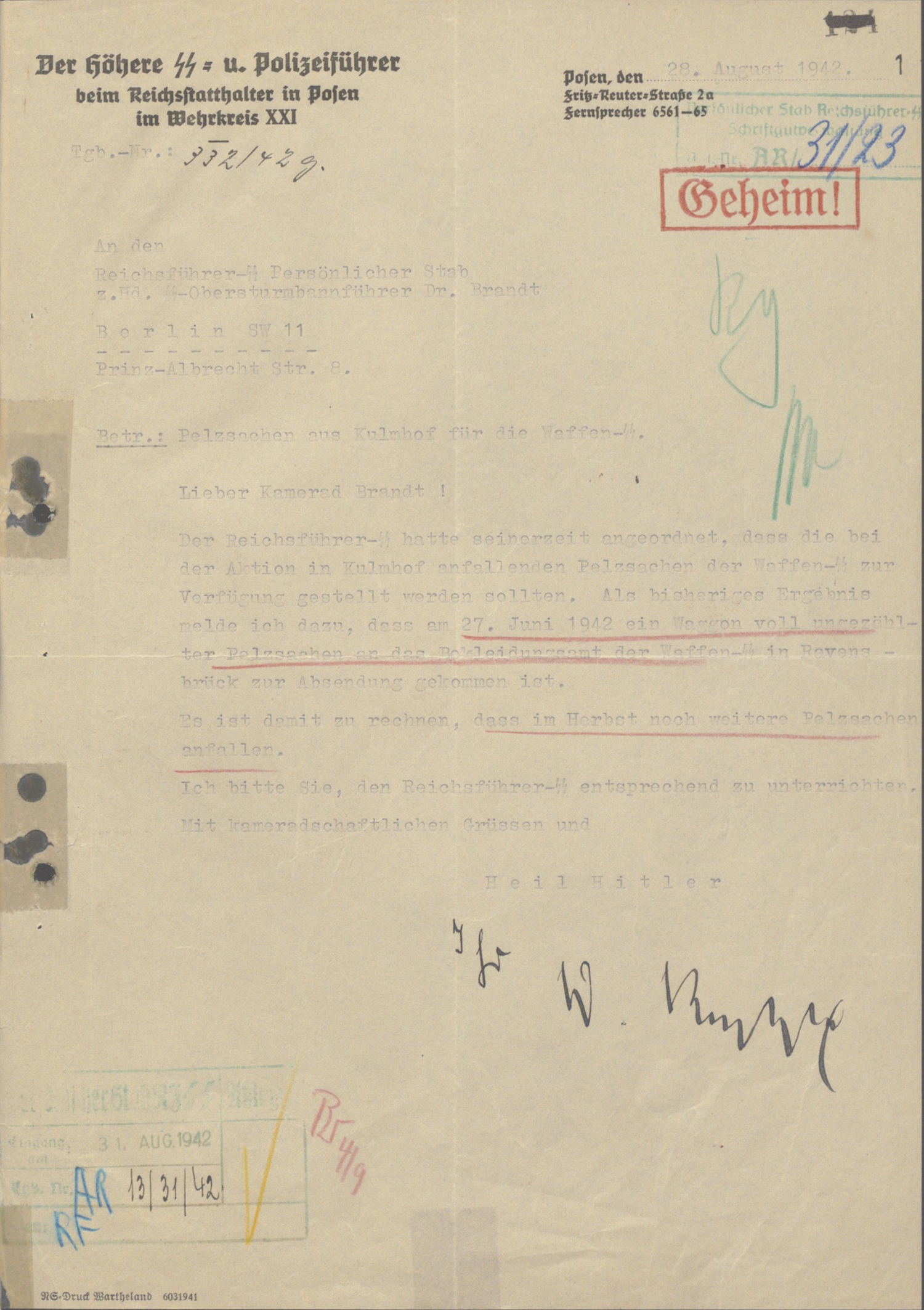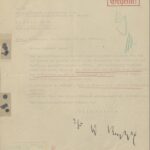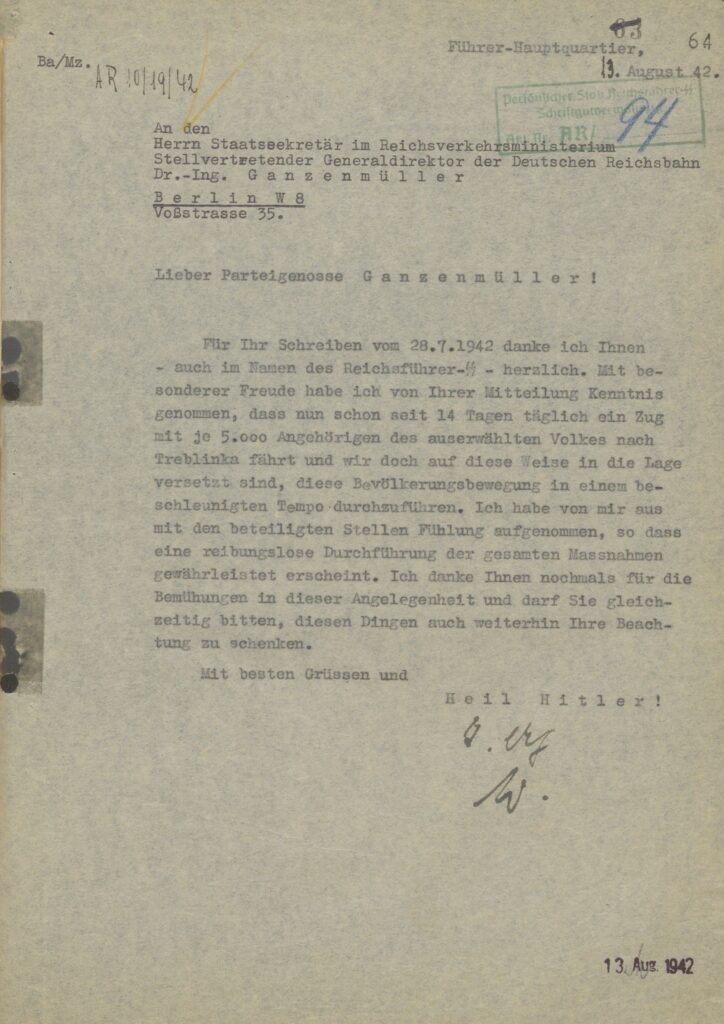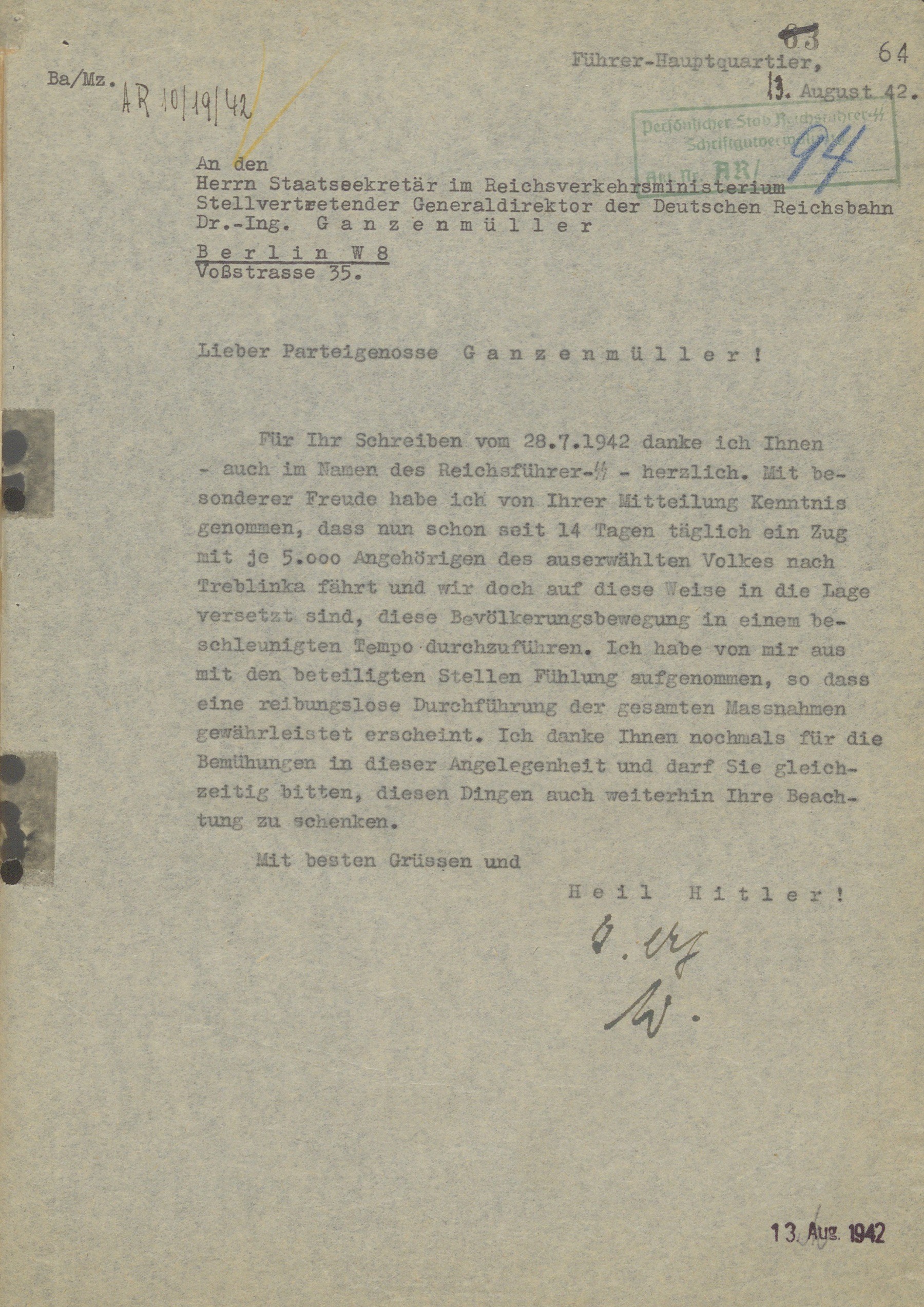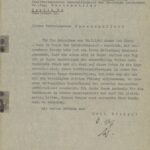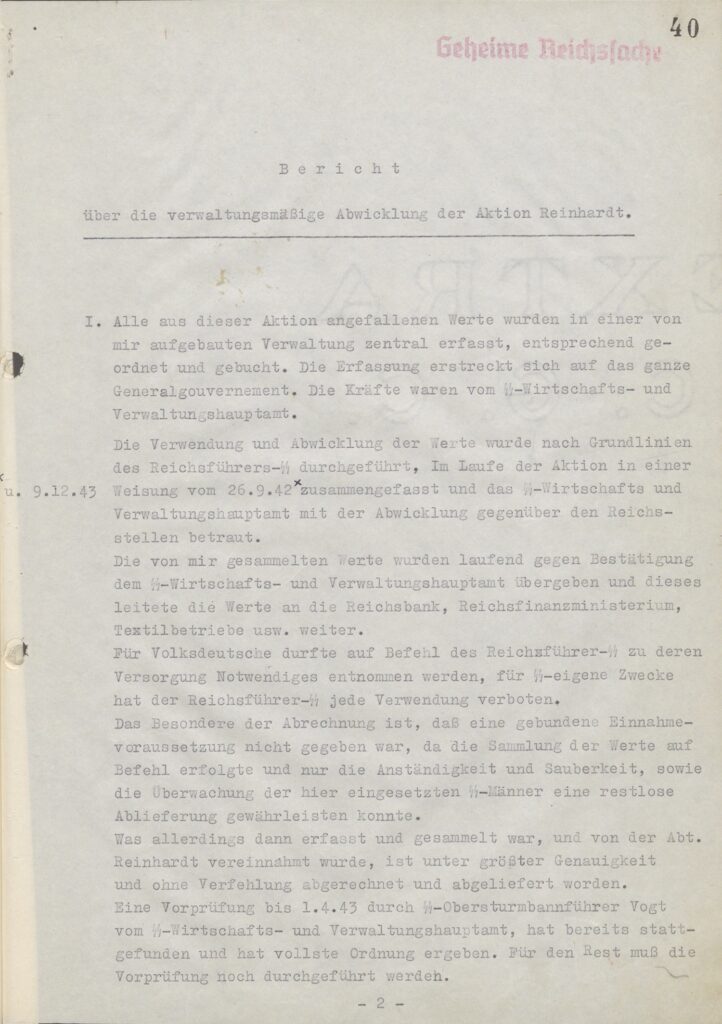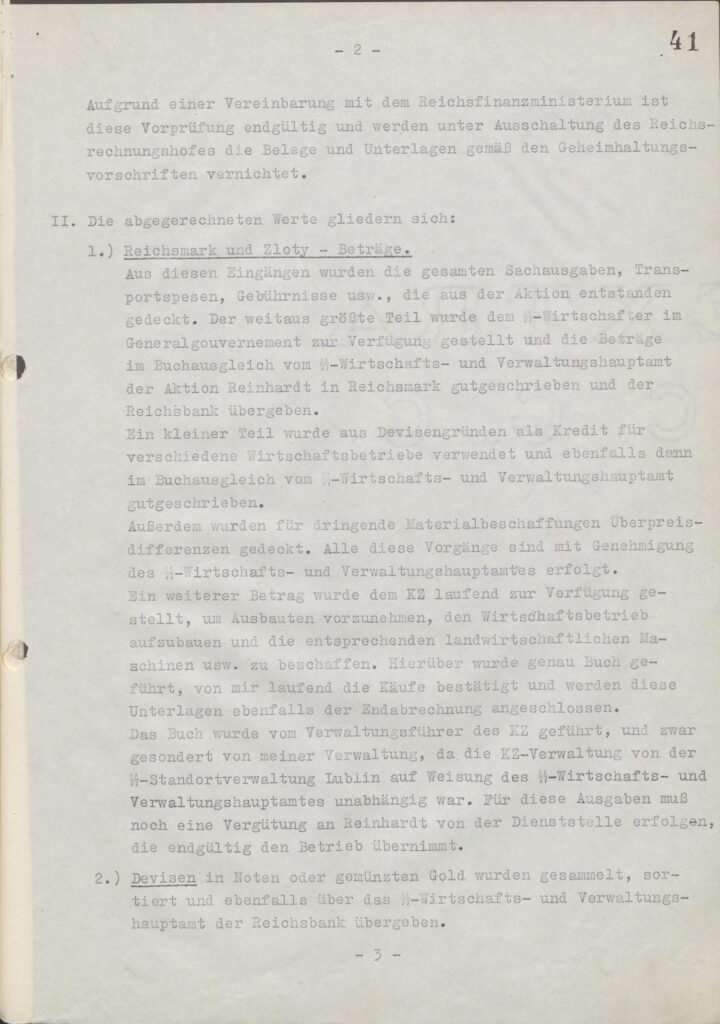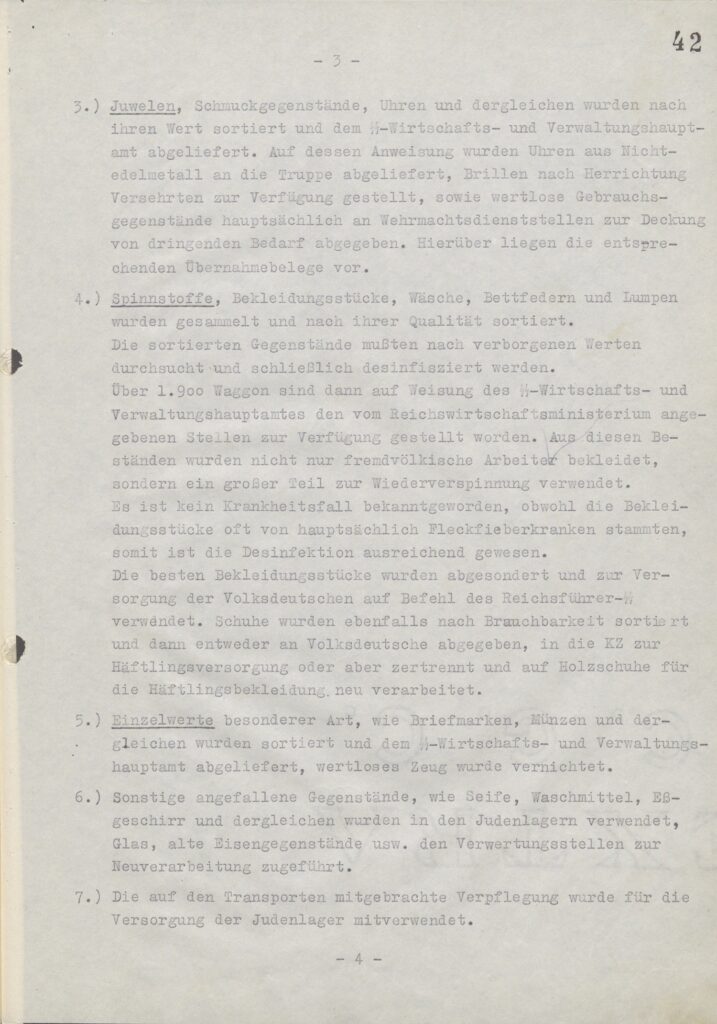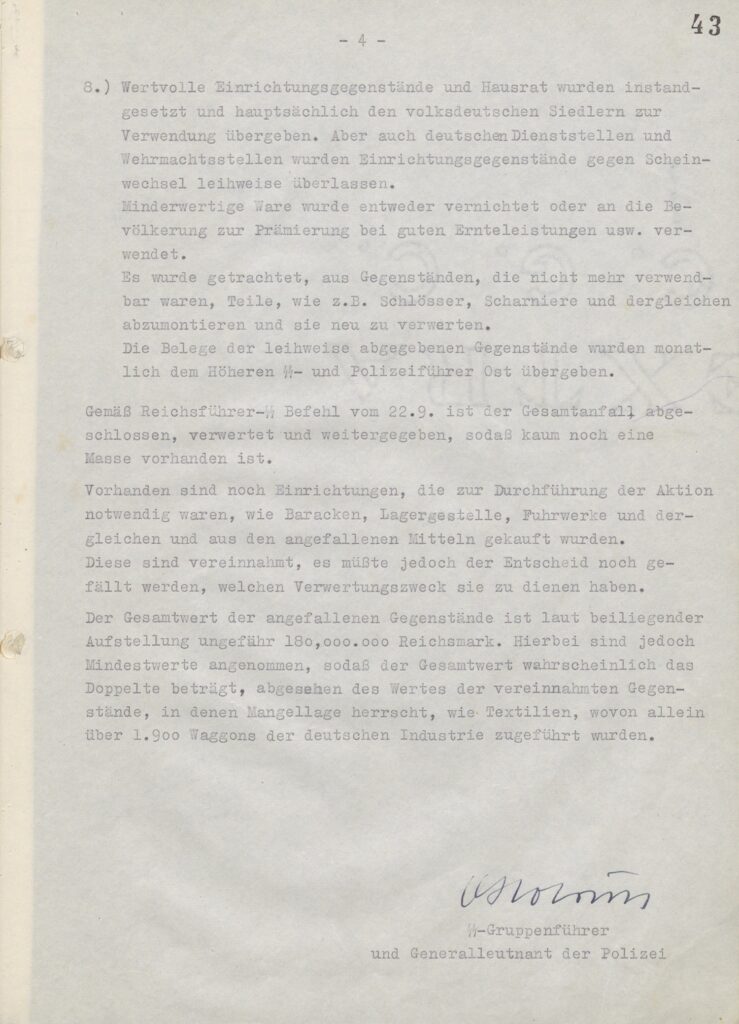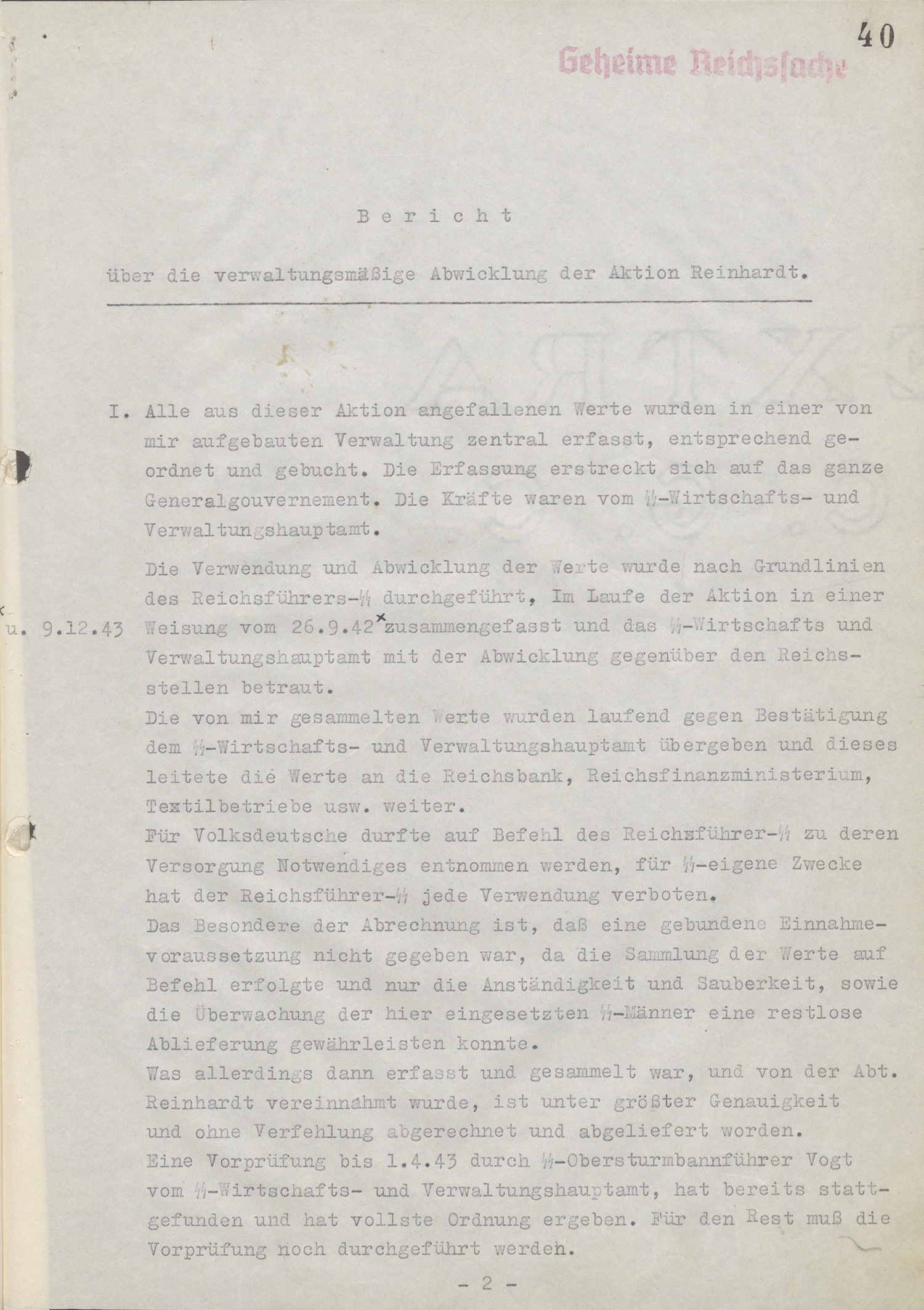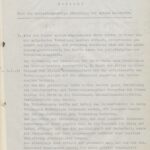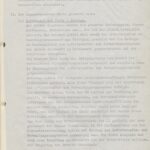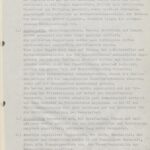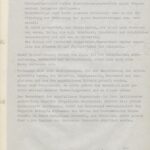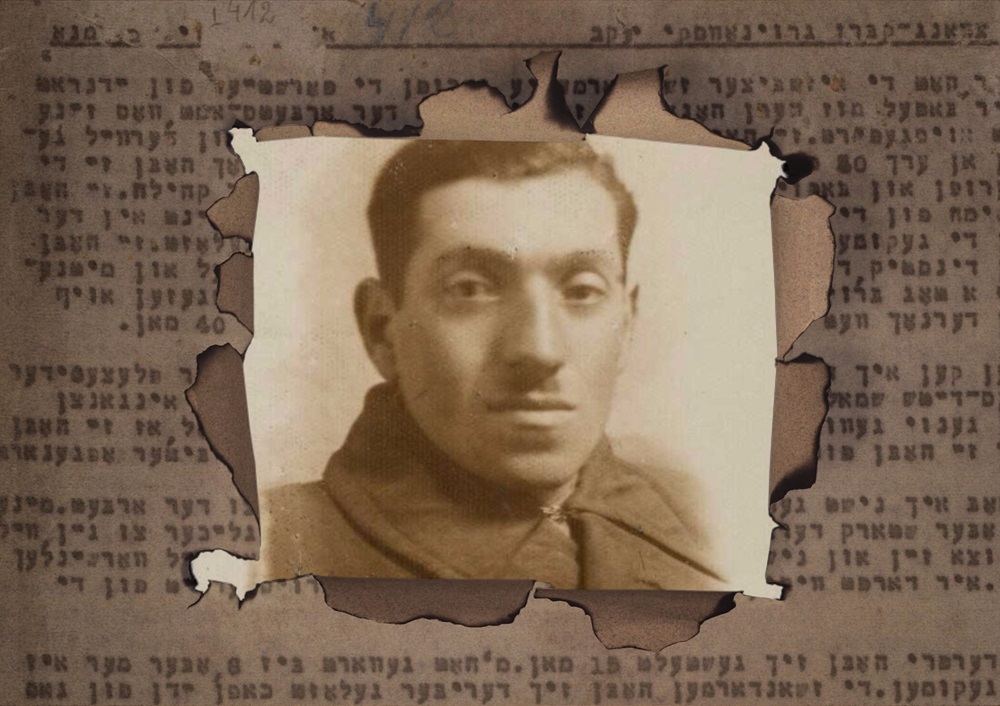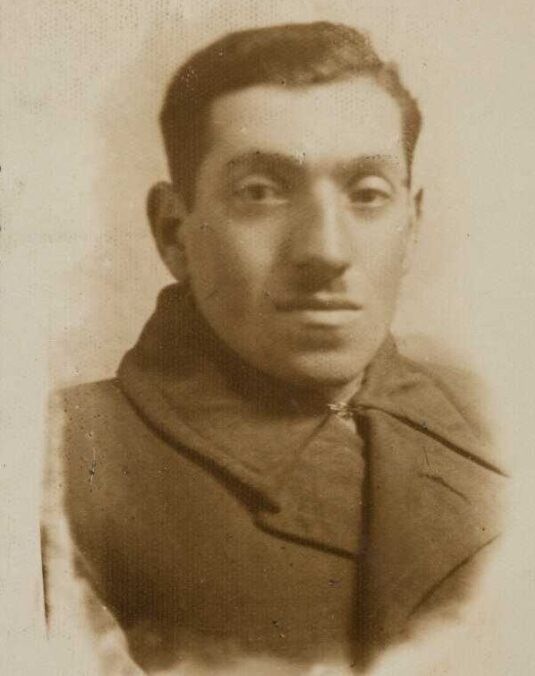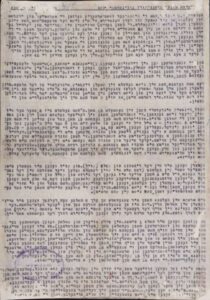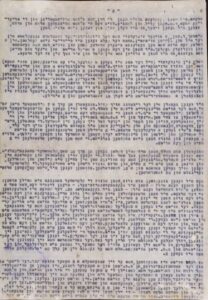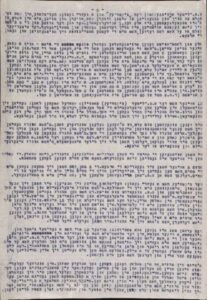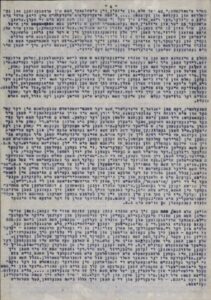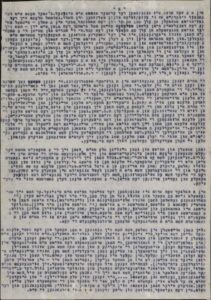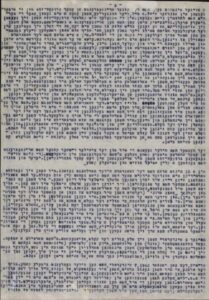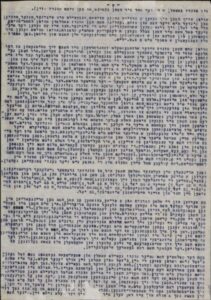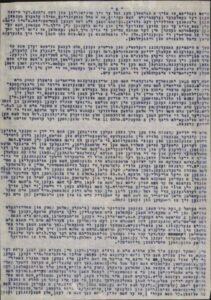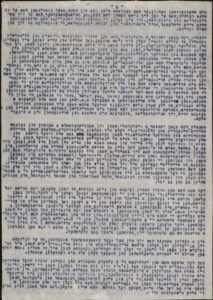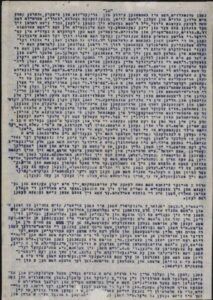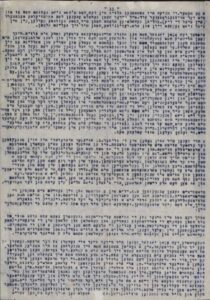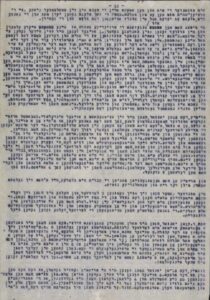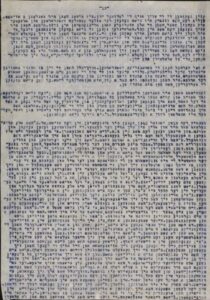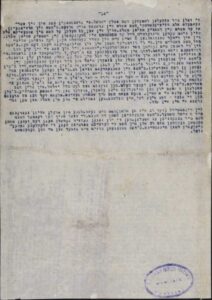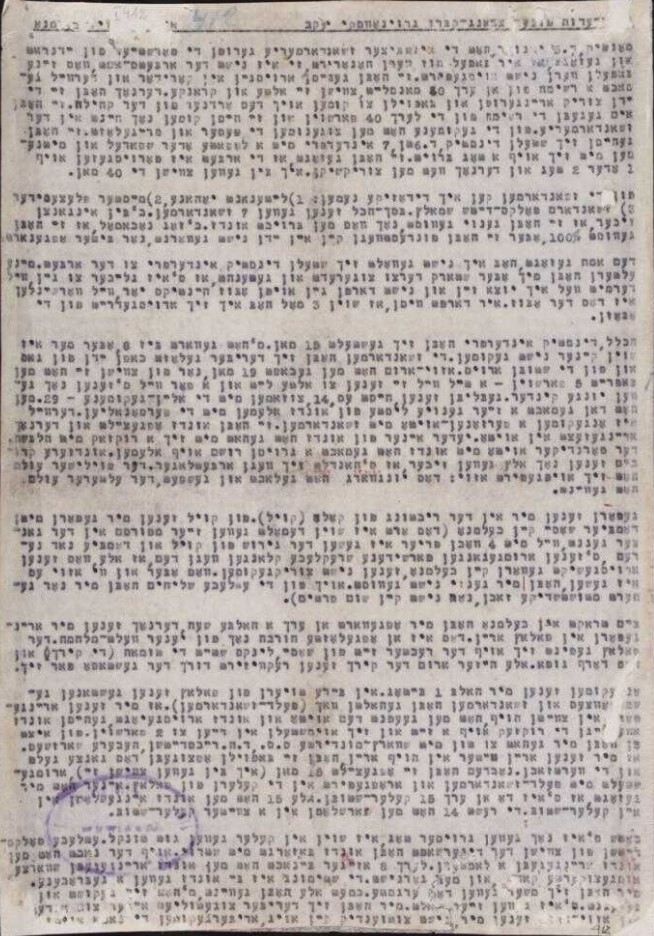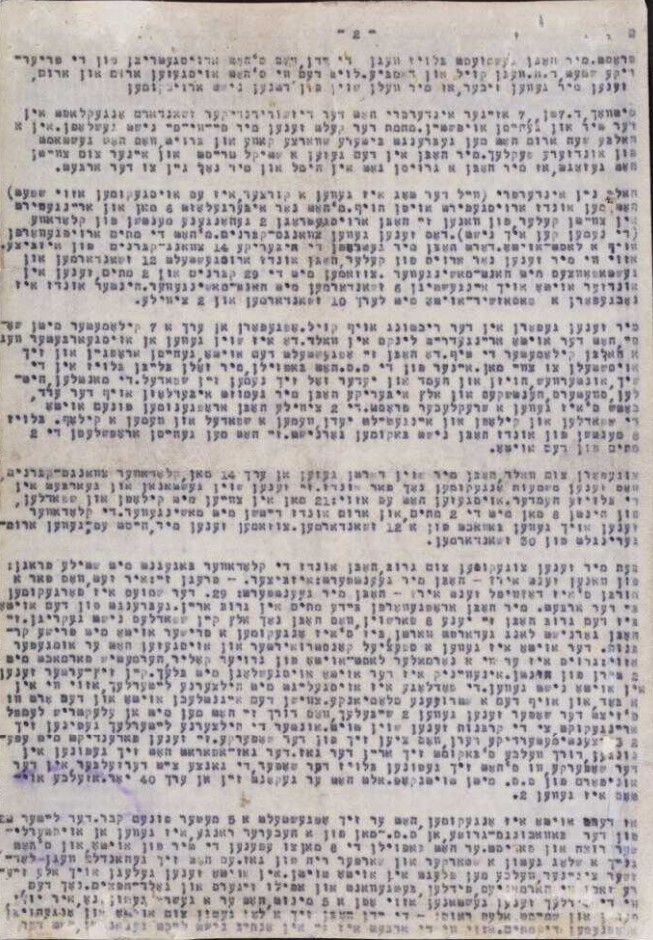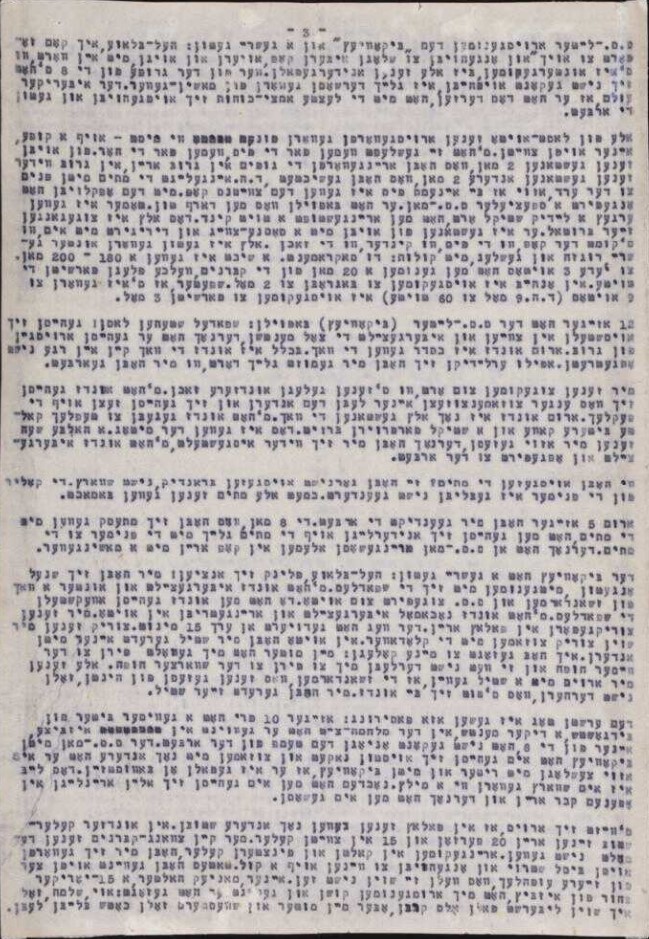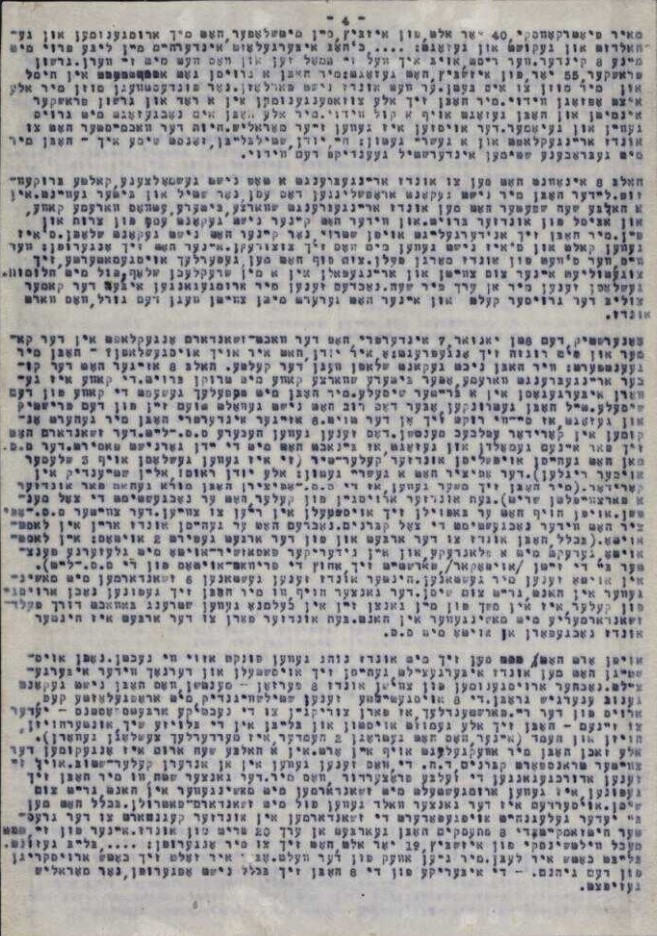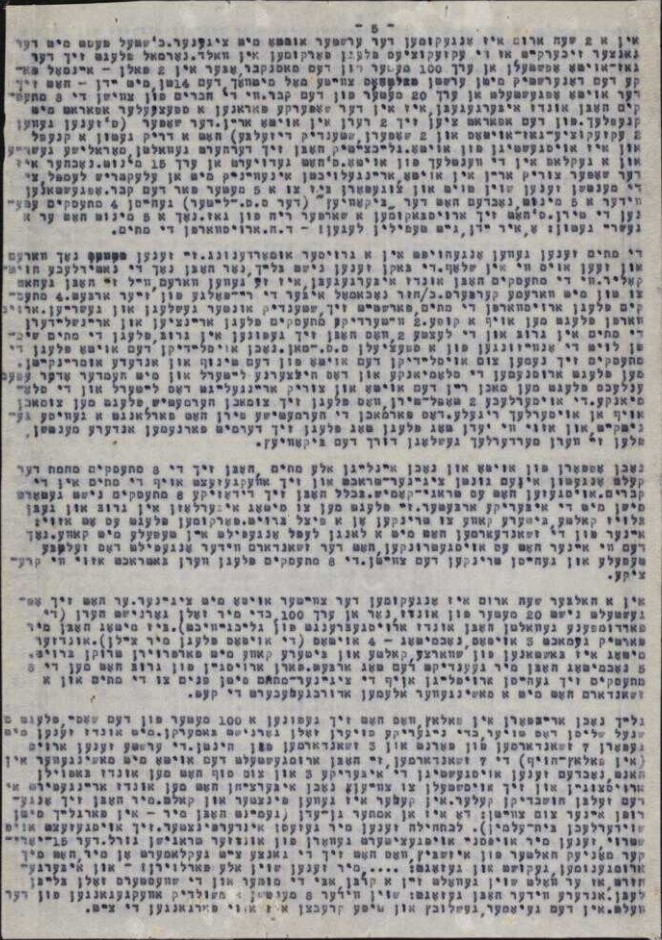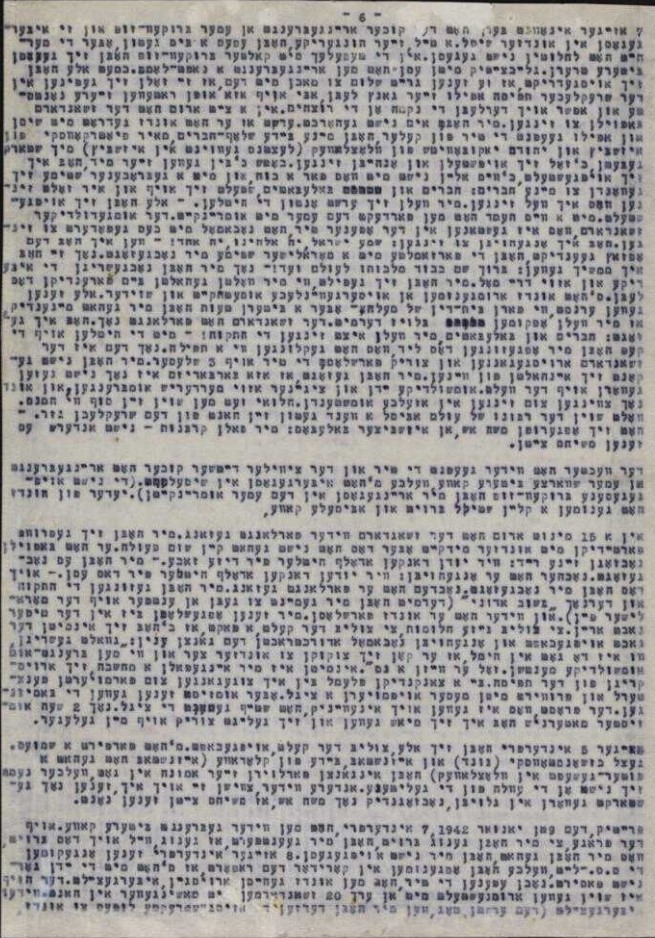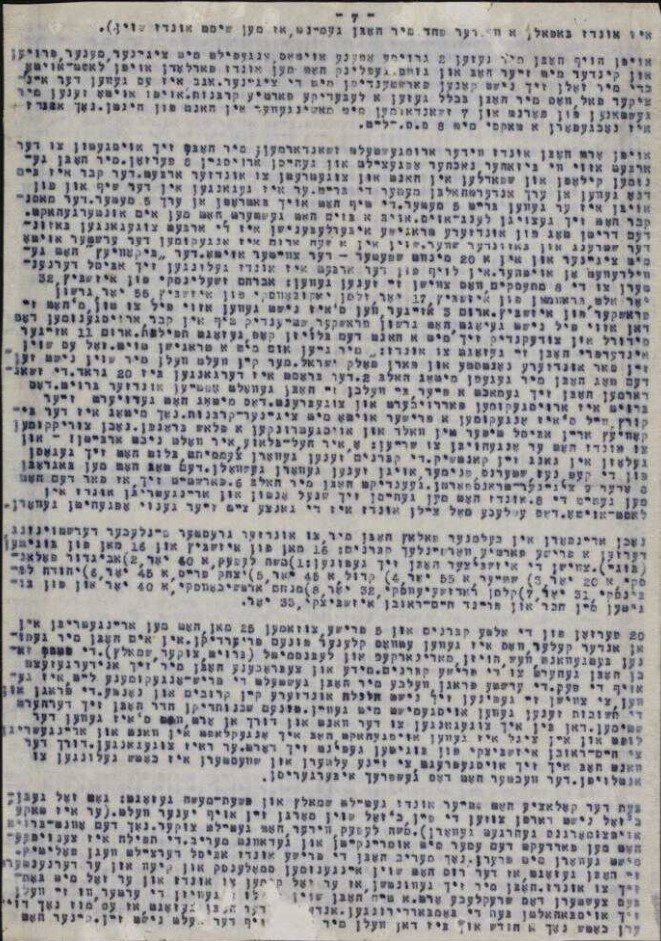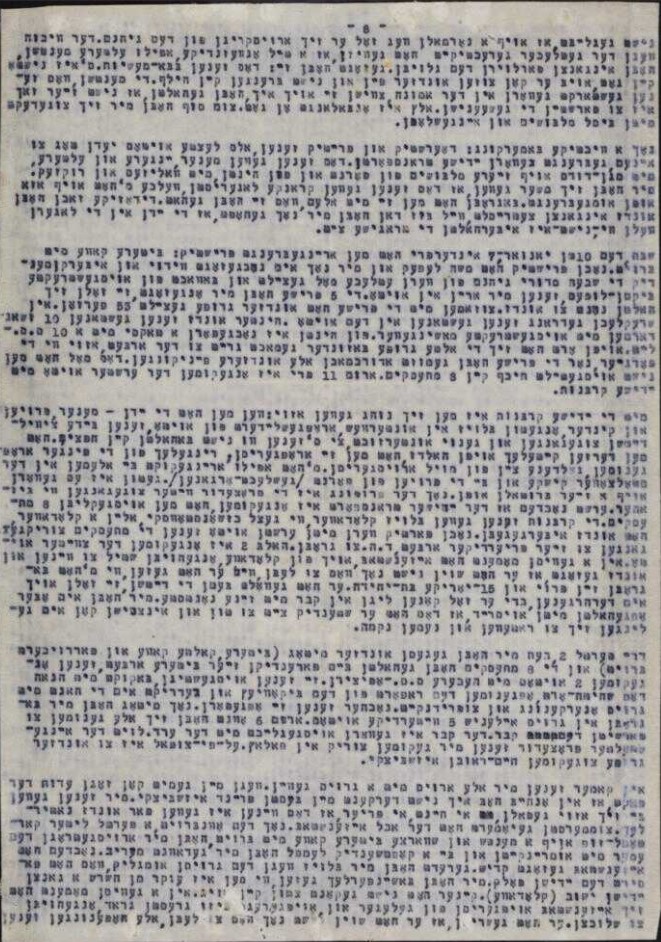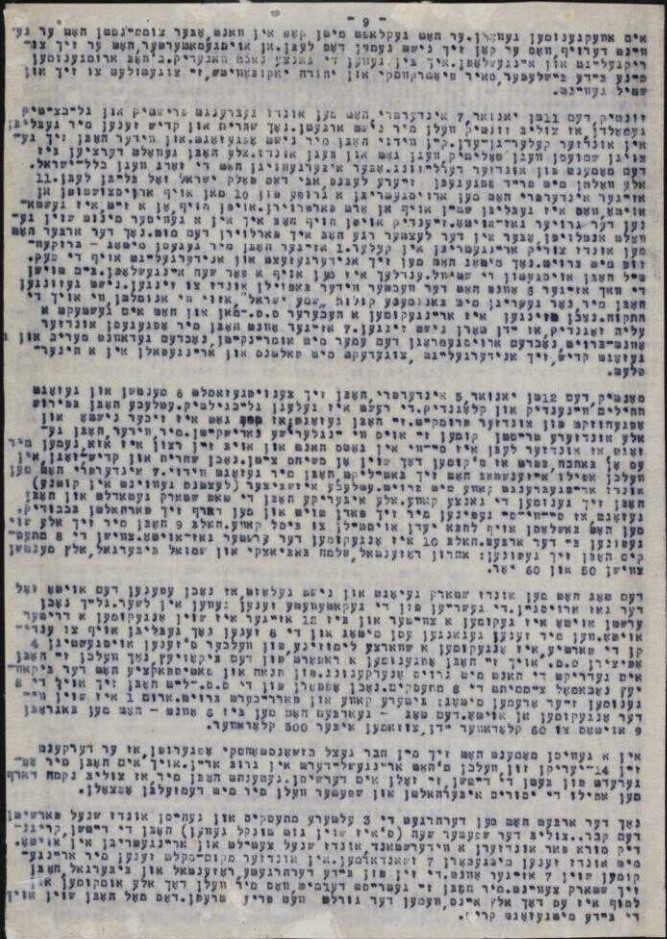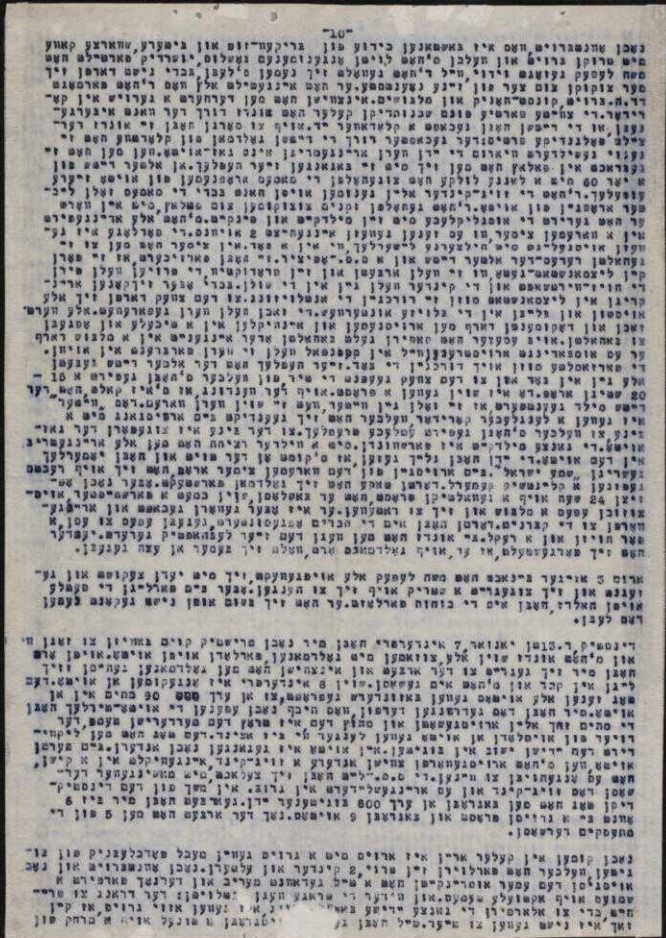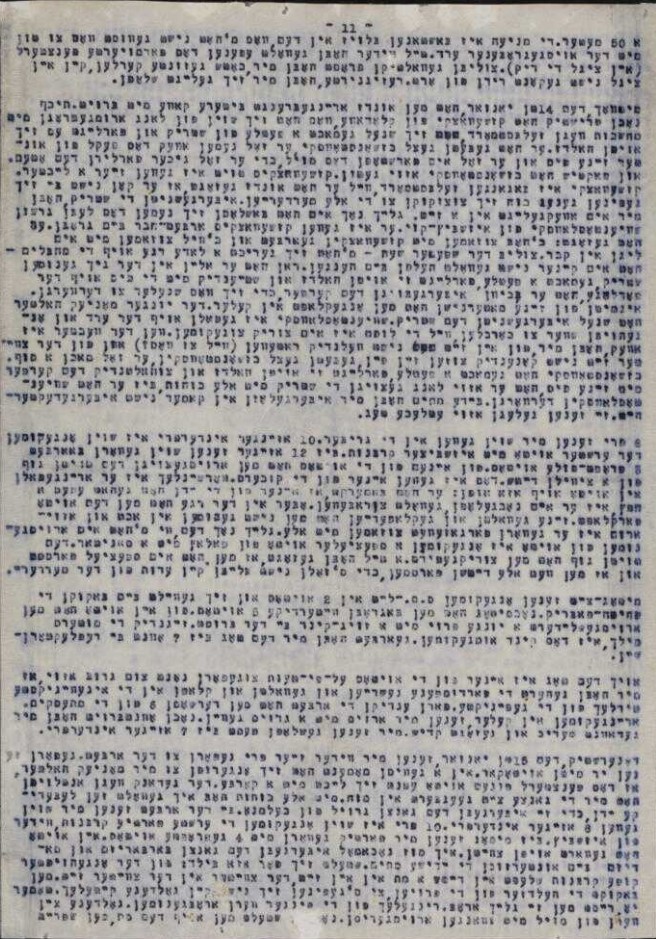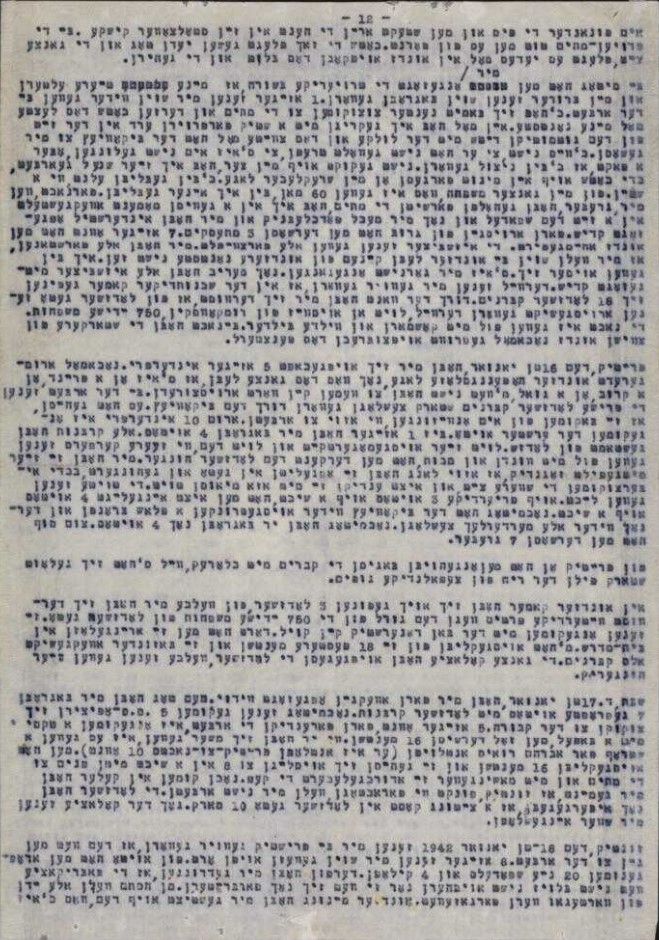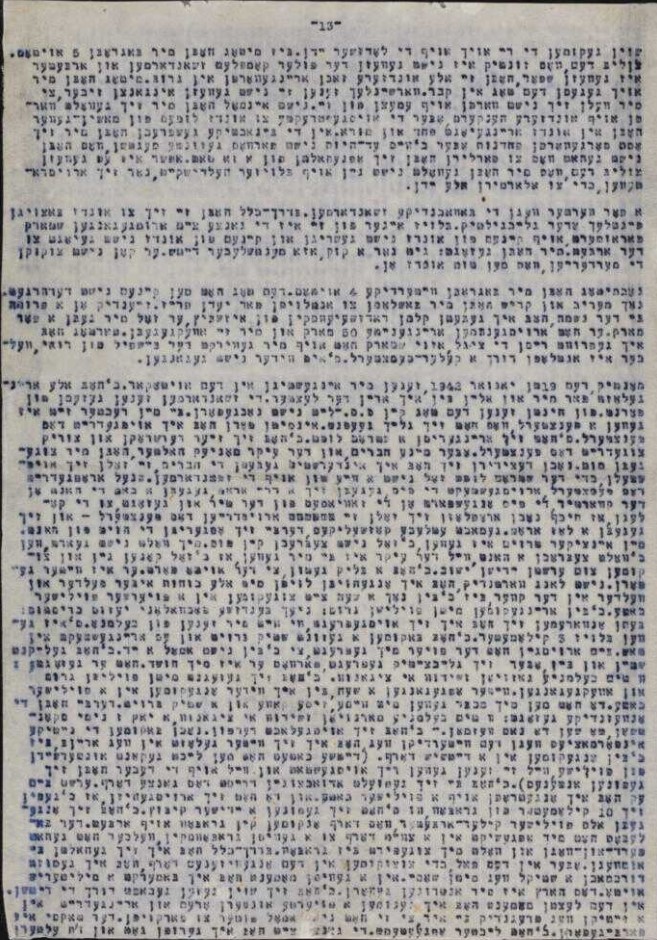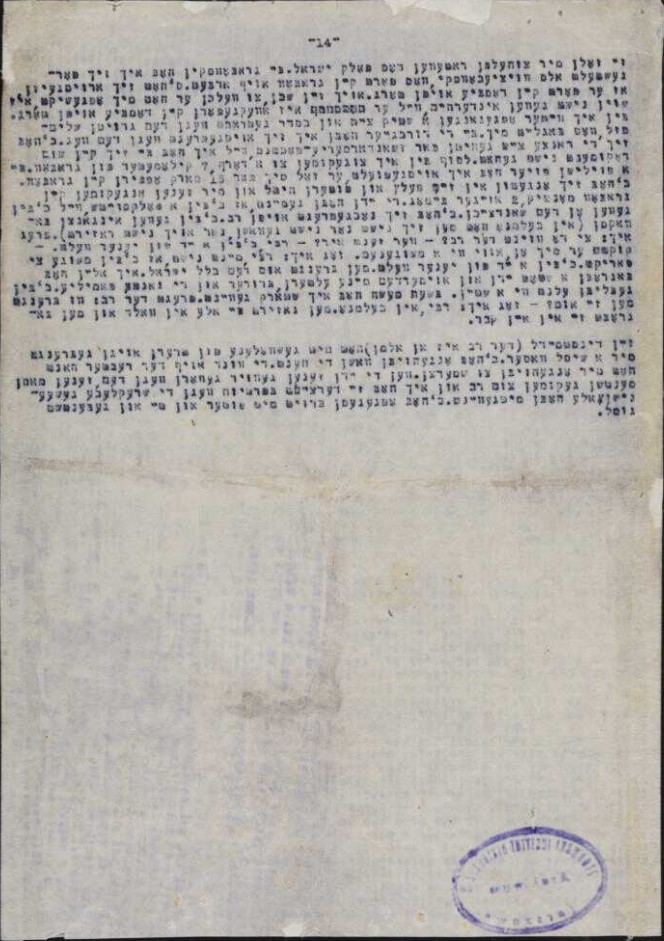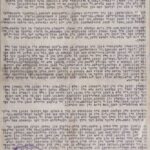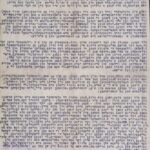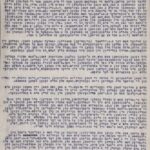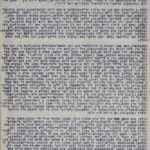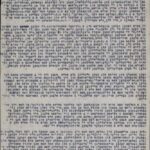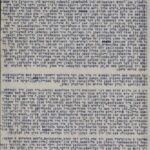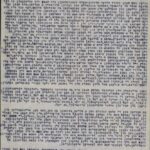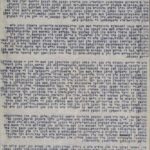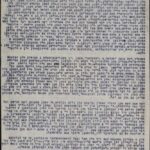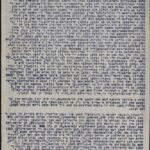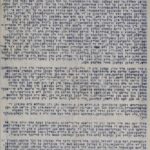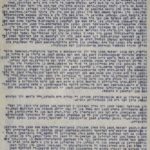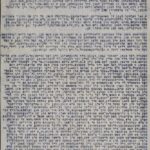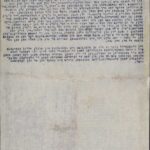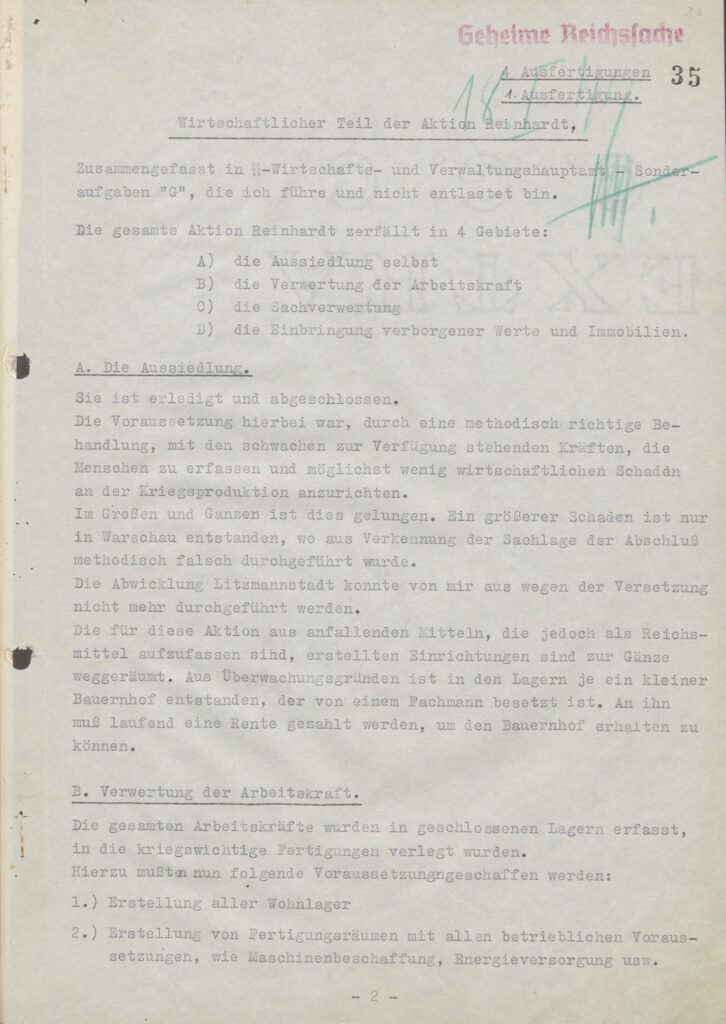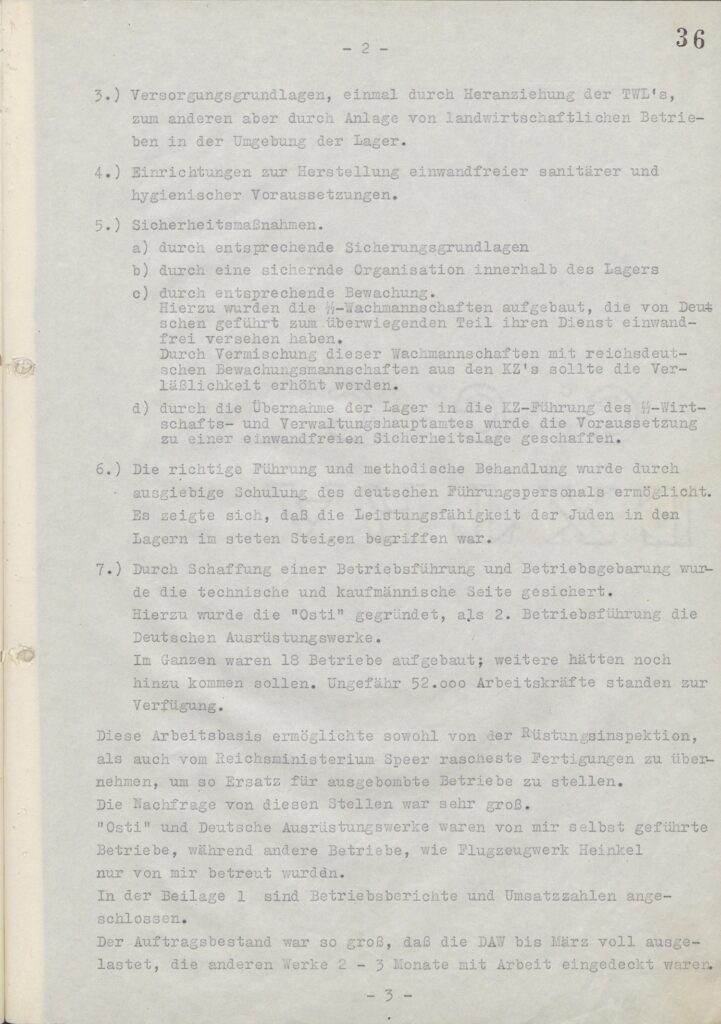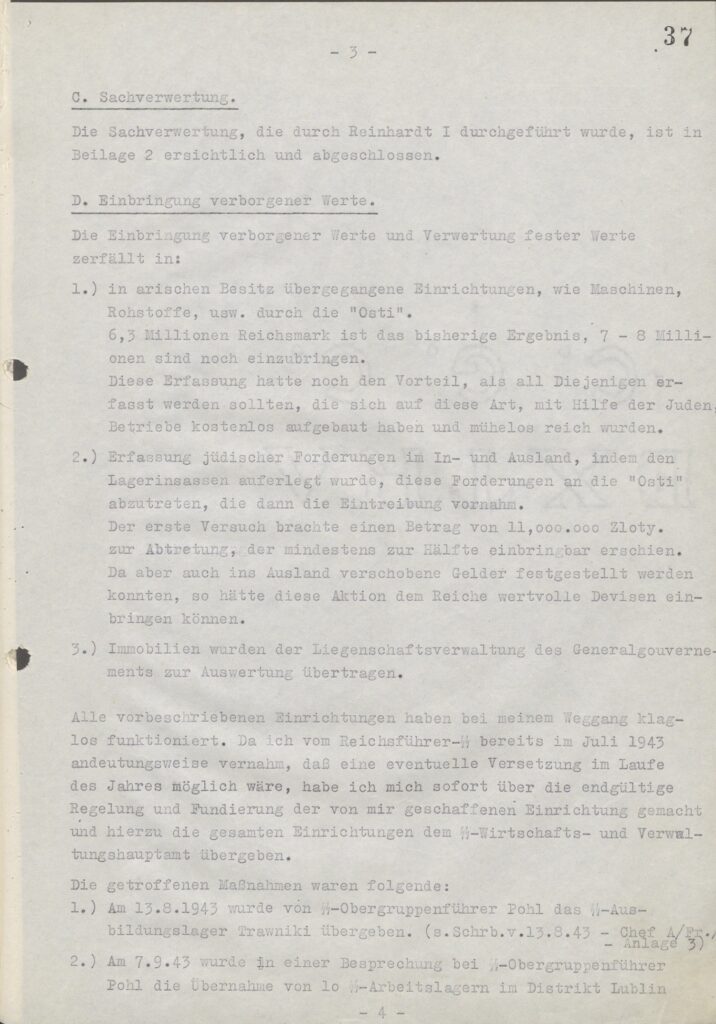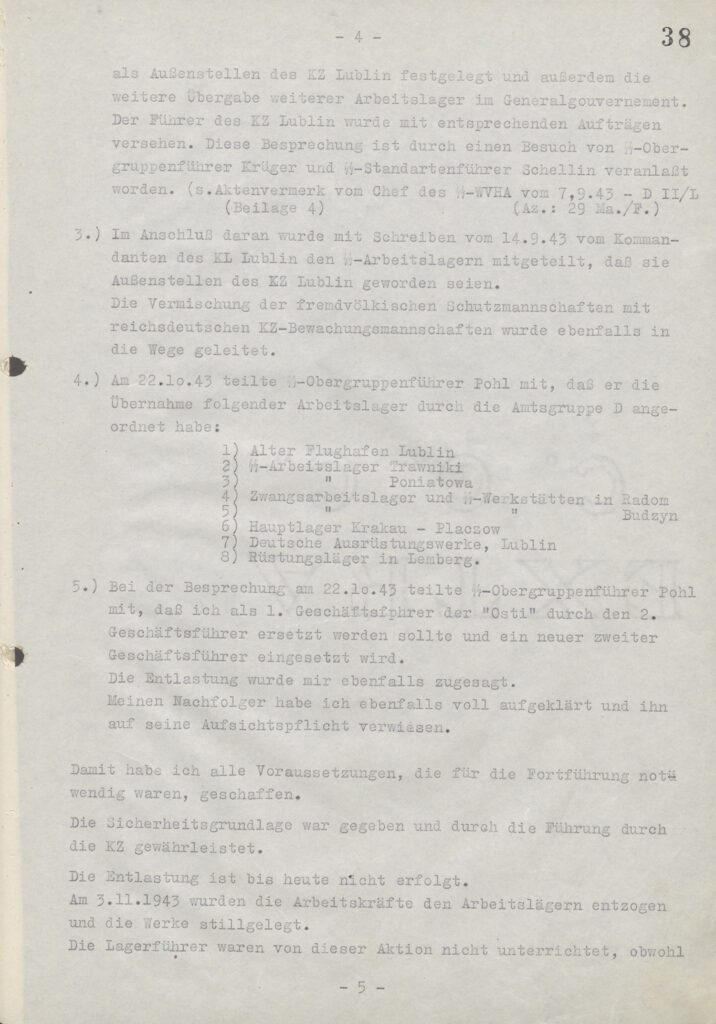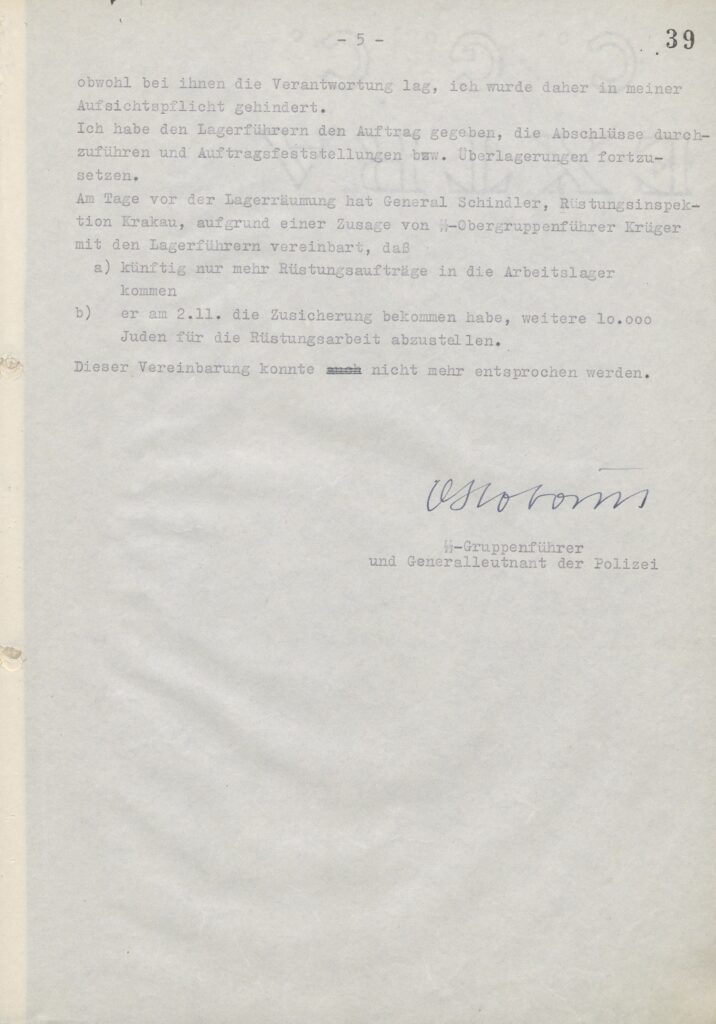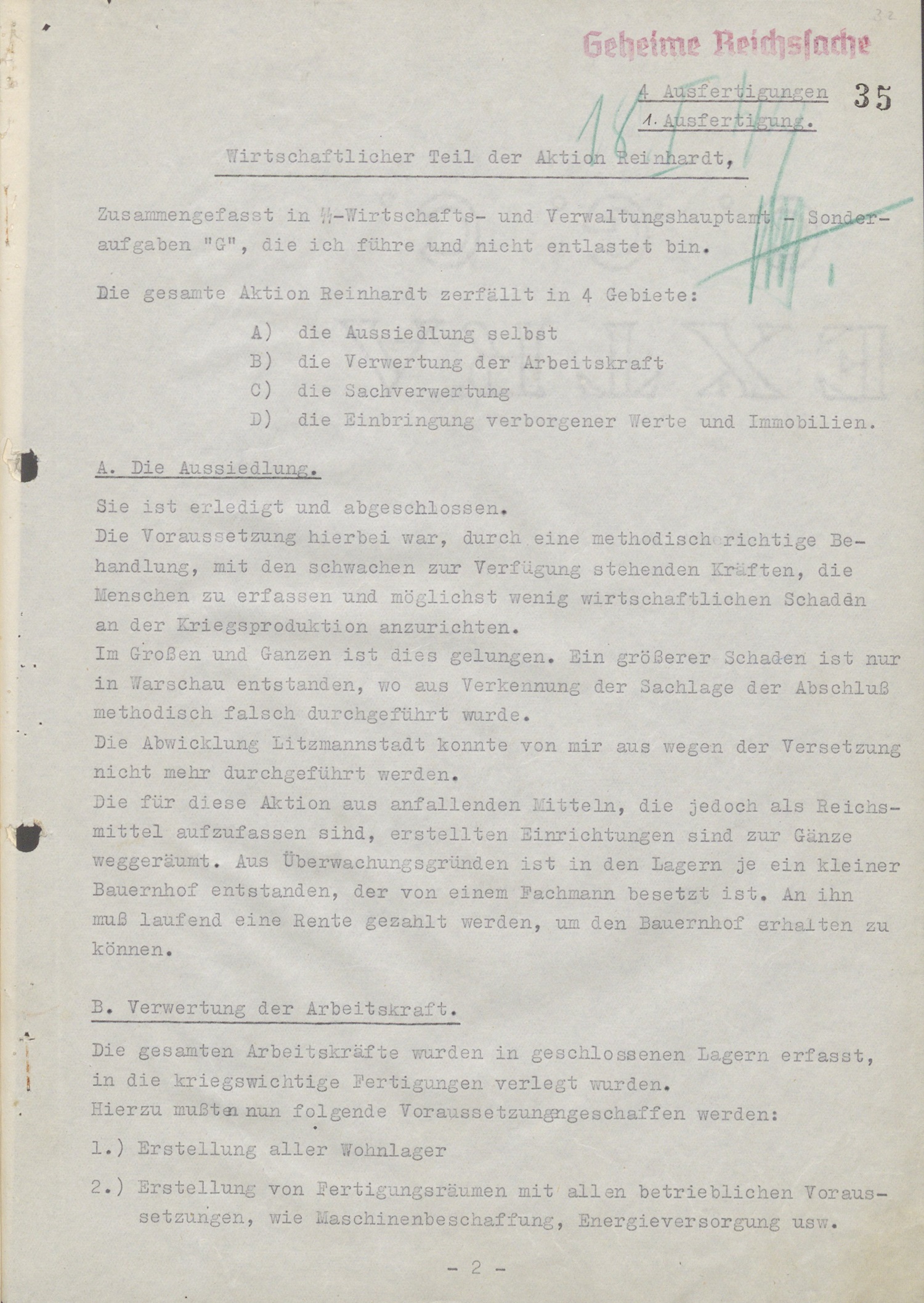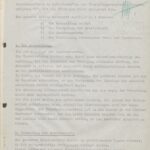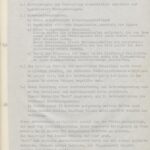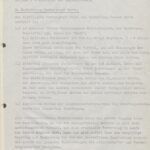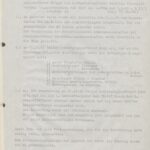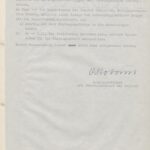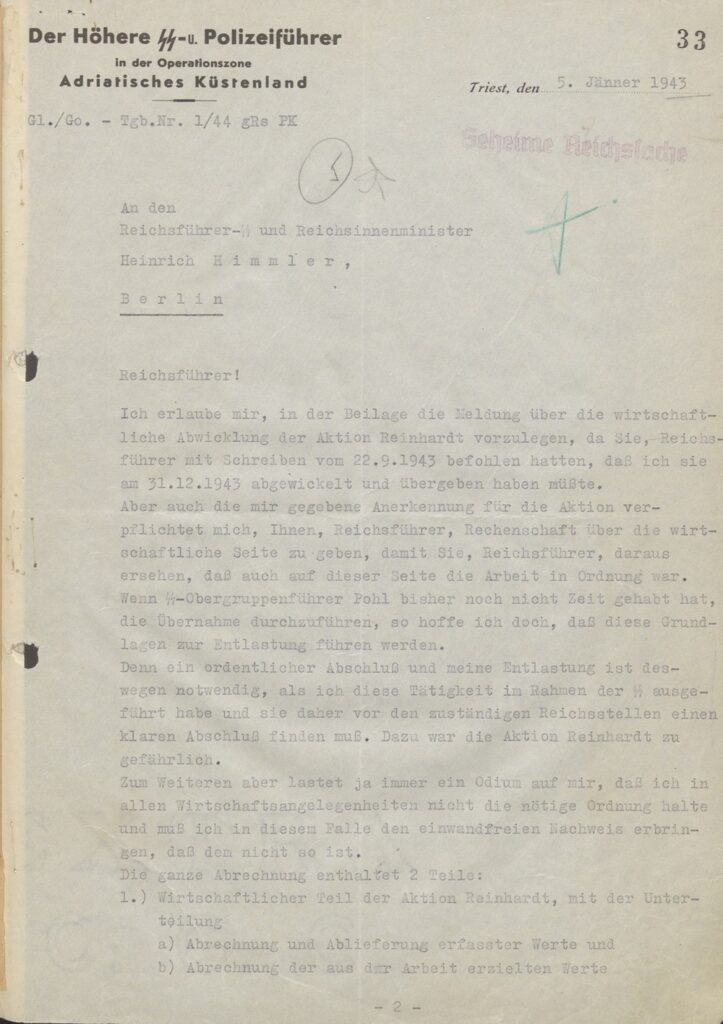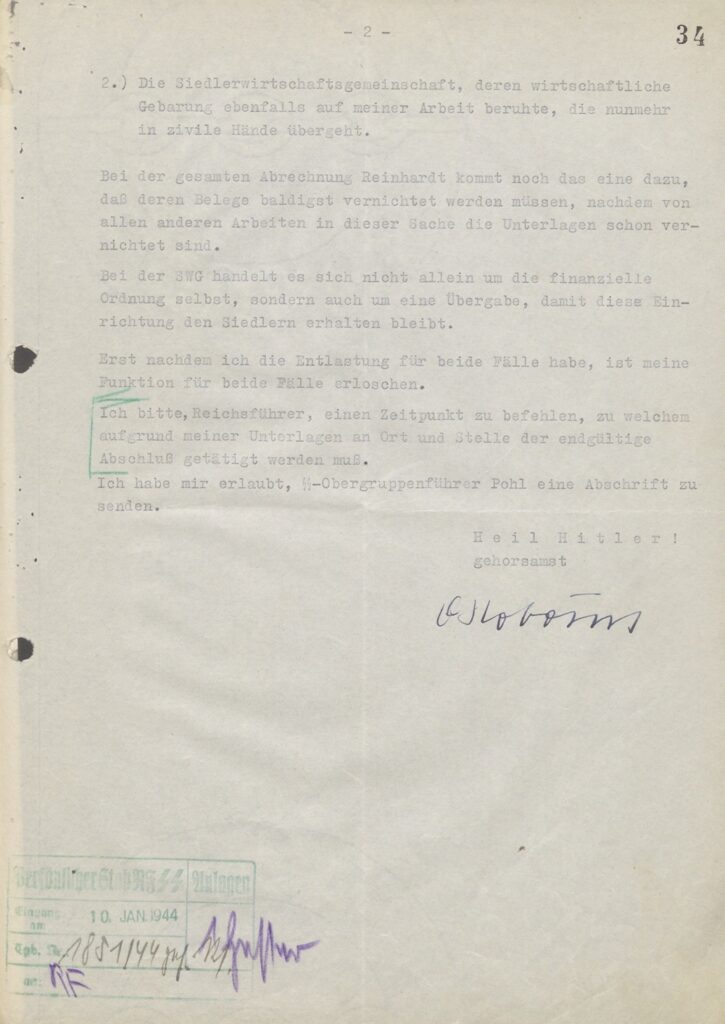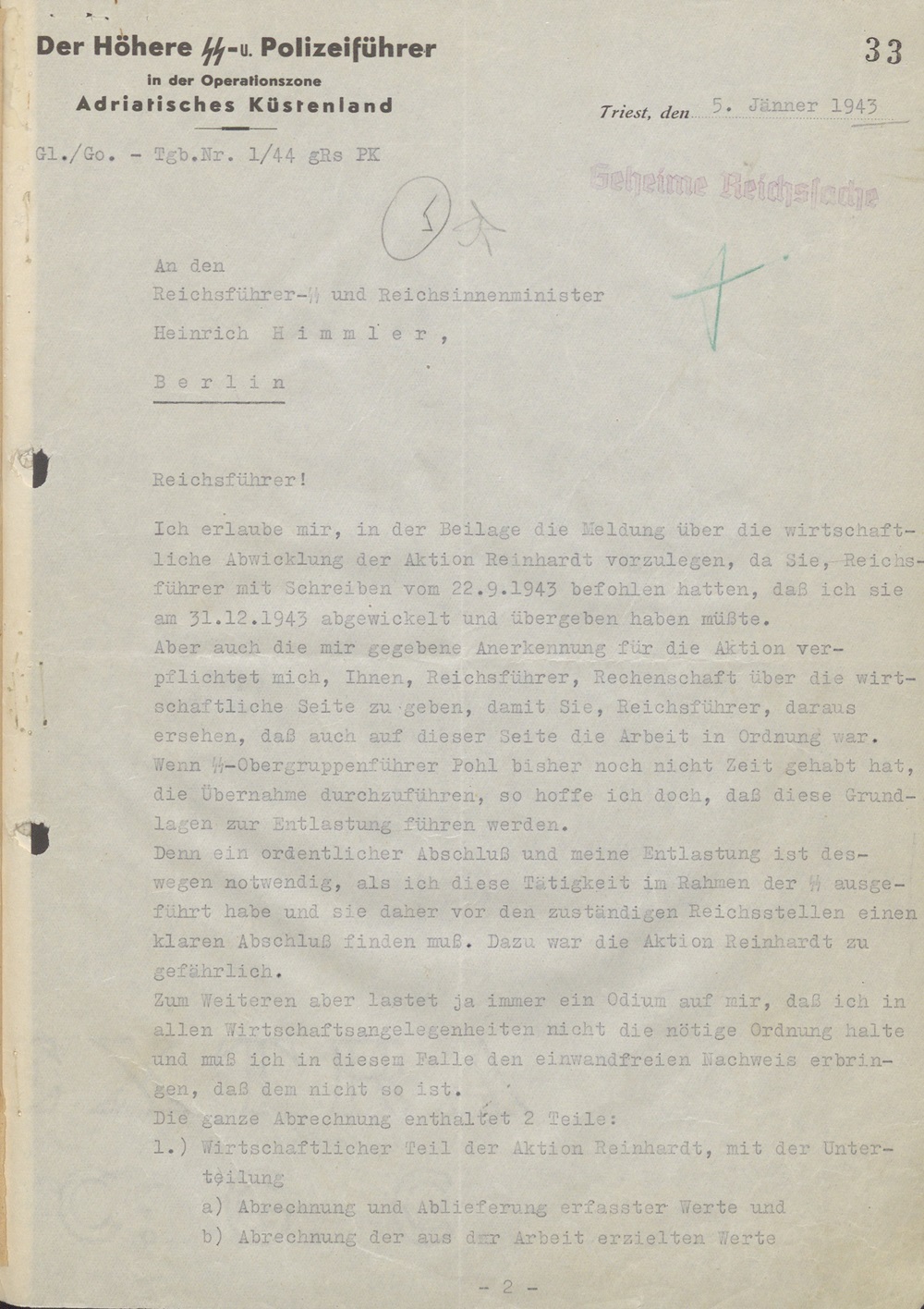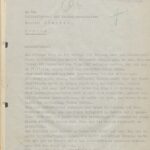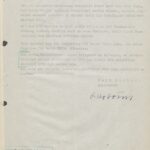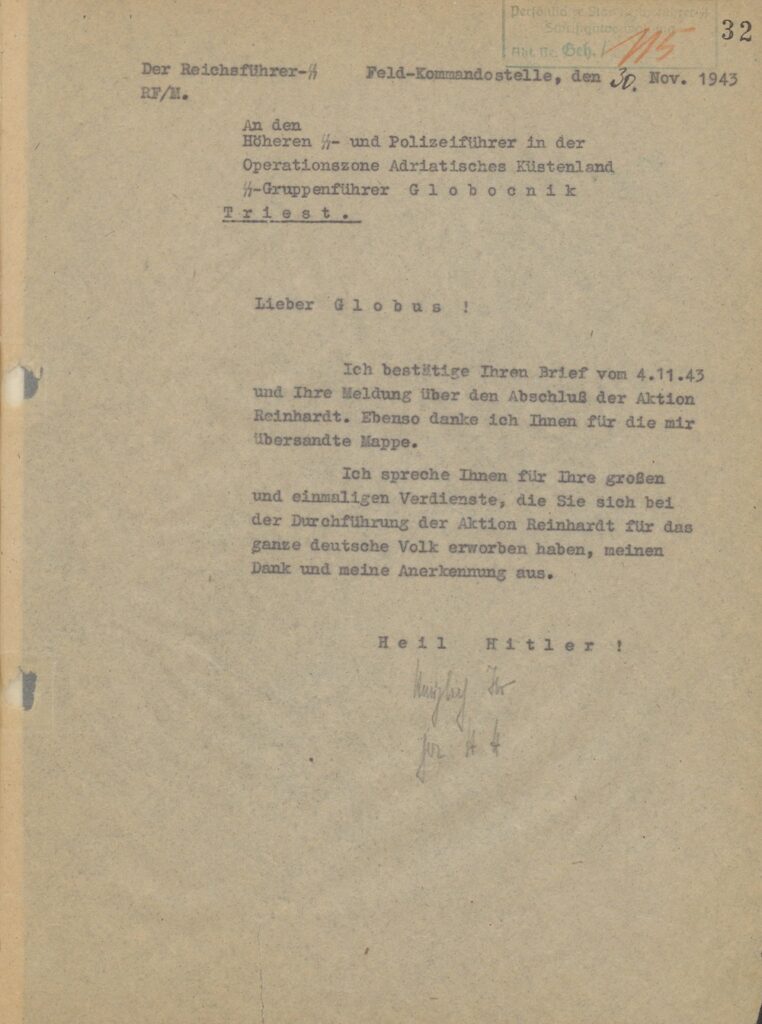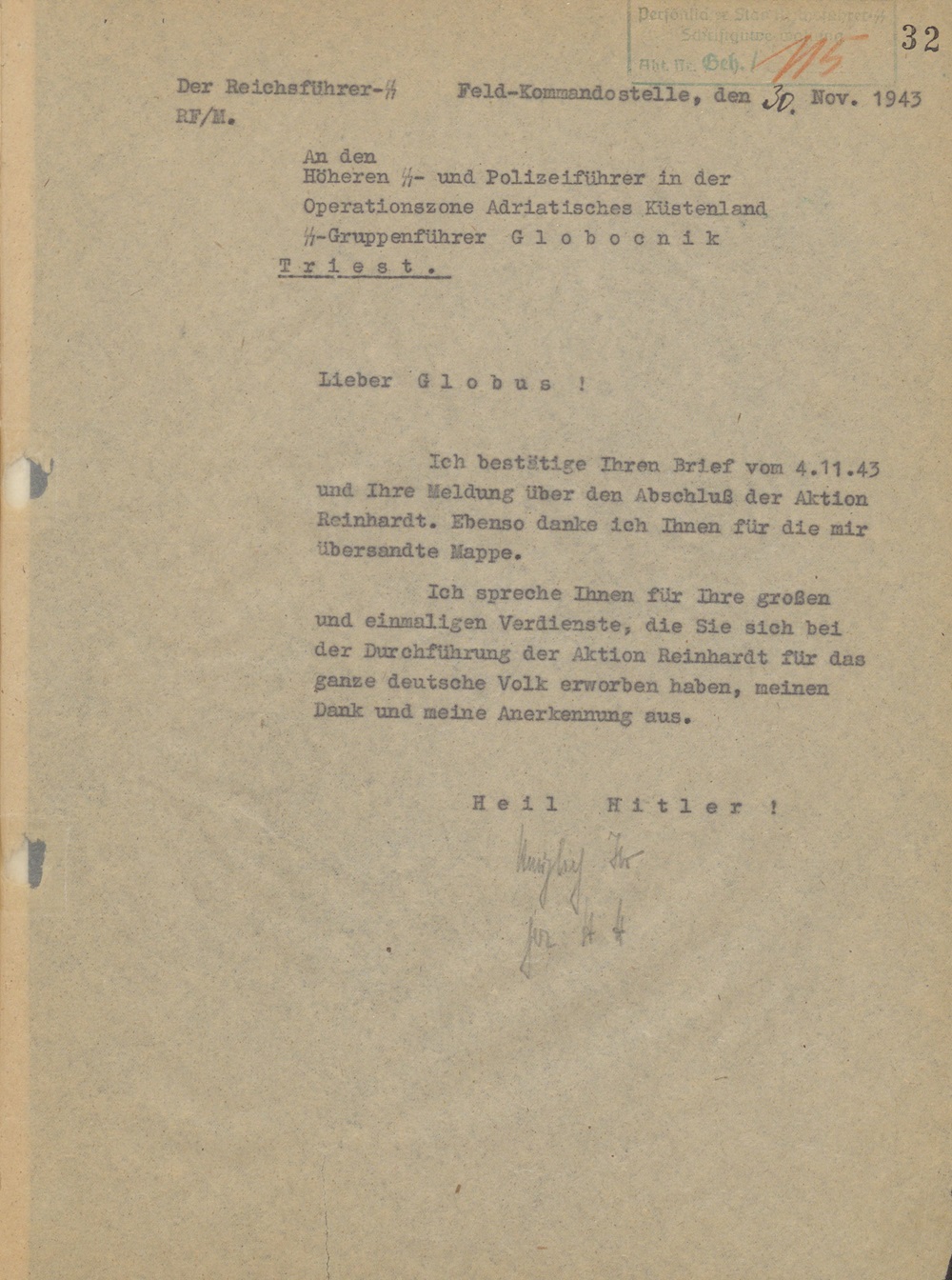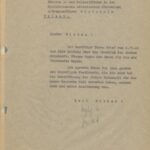[The testimony of the forced gravedigger Grojnowski, Yankew]2
On Monday January 123, 1942, gendarmes from the town of Izbica Kujawska ordered the members of the Jewish Council (Judenrat) to assemble and demanded men for work. They stated that unlike the neglected orders of the Arbeitsamt , that order had to be carried out immediately.
The same day about 40 men turned up at the police station, including the old and ill, from a list made by the gendarmes. Their documents were taken away and they were ordered to come back the following day with spades and shovels and a supply of bread for one-two days. They were told they would be able to go back home after a few days. I was among them. I knew the names of some of the gendarmes: 1. Lieutenant Johannes, 2. Meister 3. a gendarme volksdeutsch Schmalz. There were seven of them. I am convinced they were aware of our fate. I repeat, they knew perfectly well what was going on, and I am 100 percent sure of it, and in spite of that, they did not warn any of the Jews. Quite the opposite – they deceived us bitterly.
To tell the truth, I did not want to turn up for work. However, my parents strongly tried to convince me to do so, believing that this was the only way for me to avoid a labor camp. I must admit that I had already managed to avoid being sent to a camp three times.
On Tuesday morning, 15 people turned up. The gendarmes waited until eight o’clock, but nobody else appeared so they started seizing people in the streets and houses. Out of the 19 men seized, five were released: a doddering old men and four children. The remaining 14, plus the 15 who turned up “voluntarily” formed a group of 29. Then a list with their names was made. Meanwhile, a car with gendarmes arrived. We were counted once again and loaded into a van. Each of us had a rucksack packed with clothes. Our truck drew people’s attention. Our families were convinced that we were going to a labor camp. Polish passers-by behaved in various ways. The young sometimes mocked and laughed at us, but the elderly wept.
The vehicle was moving in the direction of Koło. Then we turned onto the road leading to Chełmno , a place of notorious repute in the whole area, due to the evacuations from Koło and Dąbie-on-Ner, which took place four weeks before. Incredible rumors were circulating that no one sent to Chełmno had returned. We did not know exactly what had happened there. The rumors came from messengers, but we were unable to obtain any details however.
In Chełmno the truck waited on the road for about half an hour afterwards it drove into the palace grounds. It was a ruin uninhabited from since the previous war. It is on the right side of the road; on the left there is a church and a village. All the buildings around the church had been taken ovet by the Gestapo.
We arrived in Chełmno at twelve thirty in the afternoon. The Gestapo officers were standing next to the two gates, and the palace grounds were guarded by the gendarmerie. Behind the second gate we were told to get out of the truck, put our rucksacks aside and stand in two rows. After that we were under the command of high-ranking SS officers in black uniforms (reichsdeutsche). We were ordered to hand over all our money and valuables Then 15 men were chosen and led to one of the cellars (I was among them) Later I found out that there were several such cellars. We were locked in one of them and the remaining 14 men in another.
Although it was still bright outside, the cellar was immersed in darkness. We got some straw from service volksdeutsche-men. We alsogota night-light. At about eight in the evening, we were served black coffee without sugar. Nothing to eat. We were in terrible moods, prepared for the worst. All of us were crying and saying goodbye to one another. It was very cold, so we nestled together. This way, with no sleep, we survived that freezing night. All the time we were talking about the Jews evacuated from Koto and Dąbie. Judging by what we had seen, we were becoming more and more convinced that there was no way out of here.
On Wednesday January 7 at seven in the morning a gendarme on duty banged on the door shouting: “Get up!” But because of the cold, nobody was actually sleeping. After an hour they brought bitter, black coffee and some bread from our bags. It gave us some hope – we were whispering that we still had God’s mercy and that we would go to work.
At eight thirty (late because the nights were long), we were led to the courtyard. A few people were ordered to go to the neighboring cellar and carry out two Jews (the names of whom I do not know) who had hung themselves These were prisoners-gravediggers from Kłodawa. The corpses were thrown into a truck. We met the remaining prisoners from Izbica. As soon as we came out of the cellar twelve gendarmes and the Gestapo officers with submachine guns surrounded us. In the truck there were 29 prisoners, the two corpses and six gendarmes. We were followed by a car carrying 10 gendarmes and two civilians.
We were moving in the direction of Koło. After seven kilometers the truck suddenly turned left into the woods. The route was well-traveled and a half-kilometer long. When the truck came to a halt the SS-men ordered us to get off, undress and arrange in pairs (we had our shoes, underwear, trousers and shirts on). Coats, caps, sweaters and gloves had to be left on the ground, although it was severely cold. The two civilians brought spades and pickaxes and gave one to each of us. Only eight of us did not get any tools. They were told to get the corpses off the truck.
When we arrived to the woods, we saw about 14 forced laborers- gravediggers from Kłodawa, who had arrived there before we came. Dressed in shirts only, they had already been working for some time. It looked like this: 21 people with pickaxes and spades, in back there were eight people with two corpses, and we were all surrounded by German soldiers with submachine guns. 12 gendarmes were also guarding the men from Kłodawa. We were surrounded by 30 gendarmes altogether.
As we approached a hole in the ground those from Kłodawa welcomed us whispering: “Where are you from?” “From Izbica,” we answered. They asked: “You see what misfortune? How many of you are there?” We answered: “Twenty-nine.” We were talking without taking a break from work. We threw the two corpses into the hole. They were brought from the truck by those without spades. They did not have to wait long, however, for the next van with new dead bodies. It was a specially-constructed vehicle, the size of a regular van, painted gray, with two hermetically-sealed doors in the back. Inside it was padded with sheet metal. Inside there were no seats. The floor was covered with wooden planks, just like in a bathhouse, and lined with straw. Between the inside of the vehicle and the driver’s cabin there were two peepholes, through which the driver could check if the victims were already dead. Under the wooden planks there were several 16-centimeter pipes coming from the driver’s cabin. The gas entered through a vent. The gas pedal was in the driver’s cabin. The driver, dressed in the uniform with a death’s head, was about 40 and was always the same. There were two such vehicles.
The vehicle stopped about eight meters in front of the grave. The commanding officer of the guard unit, a high-ranking SS-man, was an extreme sadist. He ordered the eight men to open the door of the vehicle. Suddenly, the strong, unpleasant odor of gas came out of the vehicle. A group of Gypsies from Lodz had just been murdered Among their belongings there were concertinas, violins, feather beds, and even watches and gold jewelry. After about five minutes the SS-man shouted: “Ihr Juden, herein und schmeisst alles raus.’’ The Jews rushed towards the vehicle and pulled the corpses out. Because the work did not go smoothly at the beginning, the supervising SS-man pulled out a leather whip and yelled: “Hellblaue, ich komme sofort zu euch,” whipping their heads, ears, eyes until everybody got to the ground. Those who could not pick themselves up, died immediately under the fire of a submachine gun. Seeing that, the rest with great effort tried to get up and complete the job.
The gassed people were thrown out of the vehicle and piled like rubbish. They were grabbed either by their legs or hair. Above the grave, there were two men throwing the bodies into it. Inside the hole there were another two men putting the corpses in layers, faces down, in the way that one person’s legs met another person’s head. A special SS-man was supervising the process. If there was any tiny space left, it was filled with a child’s body A gendarme standing above the grave with a pine branch decided where to pur the heads, legs, children, belongings, etc. This awful event was accompanied by fierce shouts: “Du Sakrament!” One layer consisted of 180-200 corpses After all three vehicles were unloaded; about twenty gravediggers buried the dead bodies.
At noon, the SS-commandant (“The Whip”) ordered: “Spadel stehen lassen.”He arranged us in pairs and counted us, and then he told those in the back to come forward. There were guards around us all the time; they did not leave us unattended so even natural needs had to be dealt with at the place where we worked.
We came to the place where our belongings had been placed. We were told to sit on the packs. We were constantly under guard. Each of us was given a cup of cold coffee and a piece of frozen bread. That was our lunch.
We were sitting like that for about half an hour, afterwards we were arranged again, counted and led for work.
What did the dead look like? No, they were not charred or black. Their facial colors remained unchanged. Almost all of the dead were covered in excrement.
At about five in the afternoon, we finished the job. The eight men who had been burying the bodies were ordered to lie on the corpses with their faces down. Then an SS-man shot each of them in the head with a submachine gun.
“The Whip” yelled: “Hellblaue, flink sich anziehen!” – We dressed rapidly and took the spades. After being counted, we were led to the vehicles under the guard of gendarmes and the SS-men. We were told to leave the spades there. We were counted once again and driven into the trucks. We came back to the palace. The journey lasted about 15 minutes. On the way back we were in the same vehicle with the men from Kłodawa.
In the truck we talked quietly. I said to my fellow inmates: “My mother dreamt of accompanying me to the white wedding canopy; now she won’t even get a chance to accompany me to my last black wedding.” Everybody began sobbing, very quietly so that the gendarmes sitting behind us could not hear. We spoke very quietly.
On the first day the following event took place: a man known as Bitter from the city of Bydgoszcz, who during the war lived in Izbica, a stout man, one of the eight burying the dead bodies, could not keep up with the others doing the job. The SS-man with the whip told him to undress and then beat him so hard that the man lost consciousness. His body turned black; it was the color of liver. Then he was ordered to lie down in the open grave and was shot dead.
There appeared to be other rooms in the palace. There were 20 people in our cellar and 15 in the other one. There were no more gravediggers at that time. Having come back to the cold, dark cellar, we threw ourselves at the scant layer of straw and burst in tears. Fathers cried over the fate of the children they would never see again. One of the prisoners, Moniek Halter, a 15-year-old boy from Izbica, hugged me and spoke to me weeping: “Szlojme, I don’t care if they kill me as long as they leave my mother and sister alive.” Meir Piotrkowski from Izbica, aged 40, embraced and kissed me saying: “I left my beloved wife and my eight children at home. Will I ever see them again? What will happen to them?” Gerszon Praszker, aged 55, also from Izbica, said: “We have a Great God in heaven and we must pray to Him. God shall never abandon us. In spite of that, we should now say our last prayer.” We all made a circle and Gerszon Praszker stood in the middle of it. Then we said our prayers. We repeated after him in sobs. The atmosphere was very lofty. Because the Wachtmeister started banging on the door shouting: “Hej, Juden, stillbleiben, sonst schiesse ich’’ we finished our last prayers in broken, silent voices.
At seven thirty, they brought us a pot of cold, unseasoned rutabaga soup. We could not swallow the food; we only cried bitterly. About a half an hour later they brought black, bitter, lukewarm coffee and some bread from our packs. And again, because of pain and suffering, no one was able to eat. It was cold and we had nothing to cover ourselves with. Someone said: “Who knows who won’t be here tomorrow?” Finally, extremely exhausted, we nestled together. We had terrible nightmares. After four hours of sleep, we jumped to our feet because of the cold. We started walking around the cell and talking about our dreadful fate.
On Thursday, January 8, at seven in the morning, the gendarme on duty knocked at the door and asked angrily: “O, ihr Juden, hat ihr euch ausgeschlafen?” We answered: „Wir konnten nicht schlafen wegen der Kaelte’’. At seven thirty, the cook brought us some warm, bitter coffee with dry bread. Some of us drank the coffee, but most did not want breakfast, saying that they would be killed anyway. At eight o’clock we heard the SS-men walking through the corridor. The gendarme reported that nothing had happened to the Jews during the night. One of the SS-men ordered the basement doors to be opened (they were locked with three locks and bolts.) The officer, remaining in the corridor, called out: “Alle Juden raus!” (We believed the SS officers were afraid that we might try to take some desperate measures). Outside, he counted us and ordered us to pair off and get into the truck. We were transported to and from the work site in two vehicles: a tarpaulin covered truck and a low passenger vehicle with glass windows on the side (a bus). We stood up in the vehicle, and behind us stood six gendarmes with machines guns at the ready. During the whole period of time I spent in Chełmno, the courtyard where we came out of the cellar was tightly guarded by the gendarmerie with their submachine guns at the ready. While we were transported to the workplace, a car with the SS-men followed our truck.
At the site everything happened in the same way as the day before After getting off the truck we were counted, arranged in a row and counted once again. Before going back to our work posts we all had to undress; we were left in shoes, trousers and shirts (one man who had two shirts on was brutally beaten). We put all the clothes in one place. After half an hour another transport of gravediggers arrived. These were the prisoners from the neighboring cell. They went through the same procedure as we did. The place was guarded by gendarmes with submachine guns and the woods were full of gendarmerie patrols. The gendarmes were required to maintain constant vigilance. Again eight men were ordered to work inside the grave. One of them, 19-year-old Mecht Wilczyriski from Izbica, said to me: “Good bye, I hope you will survive. We are dying but you try to get away from this hell.” The others were silent. Only their sighs reached my ear.
After two hours the first van with Gypsies arrived. I can state firmly that the executions were carried out in the woods. A gas-van usually stopped about 100 meters (328 feet) from the mass grave, but twice it stopped about 20 meters (65 feet) from the grave. As the “pit-workers” told us, in the driver’s cabin there was a special apparatus with buttons, linked with the inside of the vehicle by two pipes. There were always the same two drivers. They used to press one of the buttons and get out of the cabin. Soon after, the sound of anguished screams, desperate sobs and banging at the door came from inside of the van. They lasted about 15 minutes. Then, the driver returned to the cabin, switched on a flashlight and looked inside the van through a window to check if all the victims were dead. Later he moved the van closer to the grave – about six meters (20 feet) from the grave. After another five minutes “the Whip” (the SS commandant) ordered the four “pit-workers” to unlock the door. A strong smell of gas belched out from the inside. Having waited another five minutes, “the Whip” yelled: “IhrJuden, geht tefilin legen”, which meant, “throw the corpses out.”
They were lying there in their own excrements, their bodies entangled They looked as if they had just been put to sleep – their faces were not pale, but had a natural skin color. The bodies were still warm, so the “pit-workers” warmed themselves up staying close to them. Now, the order of the procedure: four “pit-workers” piled the corpses on the ground, two others pulled them closer towards the hole and then threw them into it. In the hole there were another two “pit-workers” who arranged the bodies according to the SS-man’s instructions. Having emptied the van of the corpses, the “pit- workers” went on to remove the excrement. The straw and the wooden strips were removed and the vehicle was cleaned with the “pit-workers” own shirts before the strips and the straw were placed back into the van. Locking the van door required some experience; because every day new prisoners were selected to do it, “the Whip” beat them terribly.
After the van had left and the corpses had been placed in the graves, the “pit-workers” put on colorful Gypsy clothes and sat down on the dead bodies in the graves. They were not allowed to hang around with other forced laborers. During dinnertime they were left in the graves, where they got only bitter, black coffee without even a small piece of bread. It went on like this: one of the gendarmes filled a little pot with coffee using a long ladle. After one of the prisoners had drunk his coffee, the gendarme filled the same pot and told the next prisoner to drink it. The eight men were treated as lepers.
A half an hour later, the second van with Gypsies arrived. It stopped about 100 meters (328 feet) from us so that we could not hear the screams of despair, which made us lose our temper. By lunch we did three vans, after lunch – four (we used to count them).
And again our lunch consisted of cold, black coffee, without sugar and some frozen dry bread. We finished our working day at five in the afternoon. The eight “pit-workers” were not allowed to leave the grave. They were told to lie down on the corpses of the Gypsies with their faces down. A gendarme killed them with a submachine gun.
After the “working” day was over and we were back in the campgrounds, the gate was quickly locked so that the local people could not see anything. We were lead to the cellar again. The same dark and cold cellar. Somebody said: “This is real heaven in comparison with the dreadful graveyard. We sat down on the straw in the darkness. A moment later we were again shivering at the thought of the tragedy of our fate.
Fifteen-year-old Moniek Halter from Izbica, the same person who stayed close to me all the time, embraced and kissed me and said: “We are doomed to death,” and restated his wishes to die in exchange for the lives of his mother and sisters.
In the darkness someone said: “Again eight innocent people were put to death.” And there was no end to the sobs and tears.
At about seven o’clock, the cook brought a bucket of rutabaga soup and poured it into our bowl. Some of us, those who were very hungry, ate some of it. But most of us did not even touch the food. Bent over the dishes with the cold soup, we shed our tears into it. Together with the soup they brought an oil lamp. Almost everybody was ready to accept their fate, even stay in this horrible place, if only their loved ones could be saved and if they could see the murderers severely punished.
After some time a gendarme told us to sing. We did not obey. Only after he threatened to shoot someone dead and even opened the door of the cell in order to do so, two of my inmates, Meir Piotrkowski from Izbica and Jehuda Jakubowicz from Wtoctawek (who recently had lived in Izbica), begged me to stand up and start singing. In spite of being exhausted, I managed to stand up and in a breaking voice I said to my fellow inmates: “My friends and fellow countrymen, stand up and sing with me. But first, let’s put our caps on.” All of us stood up. The bucket with the waste was covered with a shirt. The impatient gendarme standing in the open doorway rushed us in an angry voice. I started like this: “Shma Israel adonai elohaynu adonai ecfrad!” My companions repeated these words after me movingly. I kept on saying: “Baruch shem kavod Malchuto I’olam va’ed!”and the rest repeated after me three times loudly. We felt as if our lives would end in any minute. We were overtaken by grief and sorrow. We felt as if we were just before the Final Judgment. Yetwe were under the illusion that we had sung enough. But the gendarme wanted more. So I said: “My fellow prisoners and countrymen, let’s sing Hatikvah now!” With our heads covered, we sang the song, which sounded like a prayer. Then the gendarme went out and locked the door with three locks. We could not hold back our tears. We kept on saying: “Nothing like that has ever happened in the world. They kill innocent people in such a cruel way andther force us to sing. May they end up like Haman. May the Lord turn His punishing hand from us.” Mojzesz (Moses) Asz from Izbica answered: “We were meant to become victims. I can’t be mistaken – the times of Messiah are coming.”
The guard unlocked the door again and the German cook carried in a bucket of bitter, black coffee, which he poured into the bowl. The uneaten rutabaga soup was poured out into the waste bucket. Each of us reached for a piece of bread and some coffee.
Fifteen minutes later the gendarme again demanded song. We were trying to excuse ourselves by saying that we were tired, but it did not help. He told us to repeat: “ WirJuden danken Adolf Hitler für diese Sache,. We did it. Then he added: “Wir Juden danken Adolf Hitler für das Essen” We repeated these words as well. Then he demanded a song. We sang Hatikvah and then Beshuv Adonai; this was an answer to our sufferings. Finally, we were locked up again.
We fell into a deep sleep. Either because of delirium or the cold, I woke up in the darkness and started thinking the situation over once again: “If there is a God in heaven how can He allow the murdering of innocent people? May He work some miracle! Suddenly, it occurred to me that I would get away from that place. In the faint light of a flickering lamp flame I moved towards the bricked up window; using a knife I tried to scrape off some brick, but my efforts were in vain. The sub-zero temperatures, which also got to the inside, turned the bricks as hard as stones. After two hours of vain effort, I gave up and lay down on the bed.
At about five in the morning, everybody woke up because of the cold. We started talking. Gecel Chrzqstkowski from the Bund (General Jewish Workers’ Union) and Ajzensztab, both of whom were from Kłodawa (Ajzensztab used to have a fur shop in Włocławek), completely lost their faith in God, because the sufferings of the victims were not lessened. On the other hand, others (I was among them) even deepened their faith, repeating after Mojzesz Asz that the times of Messiah were coming.
On Friday, January 9, 1942, at seven in the morning bitter coffee was brought again. Asked if we had enough bread, we answered affirmatively, because we had not yet eaten the bread we had been given previously. The SS-men arrived at eight o’clock we were ordered out and then counted. The courtyard was already surrounded by about 20 gendarmes with submachine guns. On the first day, when we saw submachine gun barrels aimed at us, we were scared stiff, and we thought they would shoot.
In the courtyard we saw two big uncovered trucks full of Gypsies ~ men, women and children, together with their belongings. We were quickly loaded on a covered truck so that we could not talk to the Gypsies. It was the first time we saw the victims alive. On the truck we stood in the front with seven armed gendarmes behind us. A car carrying a group of SS-men followed our truck.
In the graveyard the gendarmes again surrounded us. As usual, we took our clothes off for work. Then we were counted and eight of us were chosen to be the “pit-workers”. We took pickaxes and spades in our hands and started working. The grave was about 1.5 meters wide at the bottom and about five meters wide at the surface; it was five meters deep. The grave was dug along a long line. If there was a tree in the way, it had to be cut down. On the third day the work was extremely hard and the treatment was extremely cruel. As soon as an hour later the first van with the Gypsies arrived; 20 minutes later the next one. “The Whip” was going mad. While working we managed to get closer to the eight “pit-workers”. Among them were: Abram Zielinski from Izbica, aged 32; Brawman from Izbica, aged 17; Zalman Jakubowski, aged 55; Gerszon Praszker from Izbica. At about three, when there was not much work (they were not rushed so much then) Gerszon Praszker, standing in the grave, pulled out his prayer book, covered his head with his hand and said his prayers. At about eleven in the morning, they said to us: “We are dying in a terrible way. May our death be redemption for our loved ones, for the whole nation. We shall never see the world again.”
That day we had lunch at one thirty. It was 20 degrees below zero. The gendarmes lit a fire and thawed out our bread; it was burnt and charred. The dinner was very quick, because another van with Gypsies arrived. After lunch “the Whip” went deeper into the woods and drank a bottle of vodka. When he returned, he started yelling: “O, ihr Hellblaue, ihr wollt nicht arbeiten!” and then he used his whip. He tormented the prisoners; their heads, noses, foreheads, and faces were in blood, their eyes swollen. On that day eight or even nine full vans of Gypsies were buried. We finished at five thirty. As usual the eight “pit-workers” were killed. We were told to get dressed quickly and were led to the van. The rule of repeatedly carrying out roll call was observed meticulously. An unpleasant surprise waited for us in the Chełmno palace, we saw a new group of prisoners (probably gravediggers), 16 of whom were from Izbica and the other 16 from Bugaj. Among those from Izbica were: Mojzesz Lepek, aged about 40; Awigdor Polanski, aged about 20; Sztajer, aged about 55; Krol, aged about 45; Jehuda Lubinski, aged 31; Kalman Radziejewski aged 32; Menachem Arcichowski, aged about 40; and from Bugaj, my friend – Chaim Ruwen Izbicki, aged 33.
Twenty ‘old’ gravediggers and five ‘new’ ones – 25 people altogether – were led into a cellar, which was a bit smaller than the previous one. We found some bedclothes, underwear, trousers, jackets, and food (bread, sugar, lard)
All these things belonged to the new gravediggers. Exhausted and depressed we sat on the packs. The first question we asked the newcomers was if there were any of our relatives among them. We cried. There were some voices coming from the neighboring cell. I went up to the wall in the place where a ventilation duct ran through (one brick had been removed) and shouted into the vent to ask if Chaim Ruwen from Bugaj was there. He came up to the wall I asked if at least his parents and sisters had managed to flee. But the guard interrupted our conversation.
During supper Sztajer divided up lard among us saying: “May God deliver me from watching this agony; I wish to end my life tomorrow.” Indeed he was shot dead the following day. Mojzesz tepek divided up the sugar. After supper, we covered the waste bucket and said the evening prayers. The prayers were mixed with tears. Then the newcomers told us a bit about politics. They said that the Russians had already taken over Smolensk and Kijow [Kiev] and were moving towards us. We wished they would and blow this horrible place up. Some of us even pointed to the places where we would hide during the bomb attacks. Others however, thought that it would have to last at least a month and by that time we would all be dead. No one believed it was possible to get out of this hell in a regular way. Some, even the elderly, completely lost their faith in God. They said: “These are fairy tales. There is no God. Otherwise, seeing our agony, he would have helped us. But those of great faith, including me, kept on saying that we could not know God’s intentions. Finally, we covered ourselves with our clothes and fell asleep.
One more thing I noticed: on Thursday and Friday, January 8 and 9, the last transports carrying Jews arrived. There were men – old and young – with Stars of David (Mogen David) sewn on their clothes, carrying suitcases and backpacks. We came to the conclusion that these were the ill from several camps. They were buried with all their belongings. We were completely shocked by this situation, because we had hoped that the Jews would survive this tragic time in the camps.
On Saturday, January 10, they served breakfast at seven in the morning bitter coffee and some bread. After breakfast, Mojzesz tepek said his prayers – a pre-death confession. The rest of us followed. Then again we went through the hell of roll call and the view of machine-gun barrels aimed in our direction. We got into the truck. We told the five ‘new’ gravediggers to stay close to us. Altogether there were 53 people in our group. The van was very crowded. As usual, we were followed by a car with SS-men. In the graveyard, the ‘old’ prisoners were separated out and told to get ready to work, while the new’ ones were treated to the torment, already well known to us. This time the eight “pit-workers” were not selected at once. At about eleven o’clock the first van with Jewish victims arrived.
The victims: men, women and children, were dressed only in their underwear. After they were thrown out from the van, two German civilians searched the bodies for valuables. They tore off necklaces, took off rings, pulled out gold teeth. They even looked into the rectum and female genital organs. The next stages of the procedure were carried out according to the plan. The new “pit-workers”, eight as usual, were selected only after the van with the Jews had arrived. Among the transported victims, there were some Jews from Kłodawa, according to Gecel Chrząstkowski, who also came from Kłodawa. Having dealt with the first van, the “pit-workers” went on to bury the corpses. At one thirty in the afternoon, the second transport arrived. Suddenly, Ajzensztab, also from Kłodawa, started crying quietly and said that his life was now pointless, because he saw the bodies of his wife and his only 15-year-old daughter being buried. He even wanted to ask the Germans to shoot him, because he wanted to be in one grave with his loved ones. We talked him out of it, explaining that there was no point in hurrying and that if he managed to escape there would be time for retaliation.
At one forty five, at lunch time (bitter, black coffee and frozen bread), when the eight “pit-workers” were finishing laying out the corpses, two cars with high-ranking SS officers arrived. They got out of the cars, examined the graves contentedly, listened to “the Whip’s” report, shook his hand in recognition, and then drove off. After lunch we buried another five transports in great haste. At about six o’clock, everybody started covering up the grave. The grave was leveled out. In the evening, we arrived back to the palace. Accidentally, Chaim Ruwen Izbicki joined our group.
In the cell we all burst out in tears. At first, I even did not even recognize my best friend Izbicki. But the greatest despair was that of the widower Ajzensztab. After supper (one-fourth liter of potato soup [about one cup] per person, bitter, black coffee, and bread) we took the waste bucket out and said the evening prayers to the light of a smoky, oil lamp. At the end, Ajzensztab recited the Mourner’s Kaddish. We talked all the time about the enormous tragedy, which afflicted our people. We were witnessing the annihilation of the entire Jewish community. No one could sleep. Suddenly Ajzensztab jumped to his feet and started sobbing in an agitated way. He claimed his life was pointless, because he had been deprived of all hope. He kept on hitting his head against the wall and crying in despair; he could not take his own life. Exhausted, he lie down again and fell asleep. I kept vigil all night long. I embraced my two colleagues, Meir Piotrkowski and Jehuda Jakubowicz, and cried quietly.
On Sunday, January 11, at seven in the morning, we were informed we would not be working. After the morning prayers and the Mourner’s Kaddish, we stayed in our cellar – the paradise. Again we talked about politics, God, and our situation. Each of us wished to be liberated. But our biggest wish was to save the nation. Each of us would have sacrificed his life for the sake our people. At eleven in the morning, we were told to move a car off the road which was out of order due to the sub-zero temperatures. I wanted to take advantage of the situation and run away, but at the last moment I lost all my courage. After work we were again locked in the cellar. After dinner, we stretched out on the bags. Some of us took our shoes off. Finally, we slept for a few hours. During the changing of the guards at six o’clock, one of the Germans again told us to sing. But it was not singing; it was the scream of breaking voices blended in with the Shma Israel and the Hatikvah. Then a high-ranking SS officer turned up. He scolded the guard claiming that the Jews were not allowed to sing. We had supper at seven in the evening. Afterwards we removed the waste bucket and said the evening prayers and the Mourner’s Kaddish prayer. Then we lay down on our beds of misery, covered ourselves with coats and fell asleep.
On Monday, January 12, at five in the morning, six people from our group gathered together and began saying Psalms, crying bitterly at the same time. The rest remained in bed, indifferent. Some even derided our piety: they said there was no God and our attempts at consolation seemed to be childish fairy tales. However, we replied that our lives were in the hands of God, and that if such was His will, we would take it with humility, especially because the Messiah was coming.
After the morning prayers and the Kaddish, in which even Ajzensztab participated, we said the pre-death prayer. At seven in the morning, coffee and bread were delivered. A few men from Izbica (recently they had lived in Kutno) took all the coffee for themselves. The rest condemned this deed saying that in the face of death we should all behave with dignity. It was decided that the coffee would be shared from now on. At eight thirty, we were all already at work. At nine thirty, the first gas-van arrived. Among the eight “pit-workers” there was Aron Rozental, Szlojme Babiacki and Samuel Bibergal, all aged between 50 and 60. That day we were rushed using extreme bestiality. We were not allowed to wait until the gas had evaporated after the doors of the gas-vans were opened. The screams of the murdered were indescribable. One van arrived right after the other, and before noon even a third one arrived. When we went for lunch, the eight “pit-workers” stayed in the pit to finish their job, a black limousine with four SS officers turned up. They also listened to “the Whip’s” report, and they shook his hand in recognition. As a sign of his satisfaction, “the Whip” tormented the “pit-workers” again. After the SS officers left, the eight “pit-workers” were finally allowed to eat their miserable lunch: bitter coffee and frozen bread. At about one in the afternoon, another van with the victims arrived. That day, by six o’clock, nine vans arrived, each of them carrying 60 victims. Altogether, more than 500 Jews from Kłodawa.
At one point, my friend Gecel Chrząstkowski recognized his 14-year- old son being thrown into the grave. He also wanted to ask the Germans to shoot him, but we persuaded him out of doing so. We claimed he should bear it all patiently and think about future retaliation. After work the Germans killed three ‘old’ “pit-workers” and told us to cover the grave quickly. Because it was late and completely dark, the Germans, probably afraid of resistance, hurriedly separated us and led us to the vans. There were seven gendarmes in our van. We reached our “asylum” in the evening. The sons of the two killed men, Rozental and Bibergal, were in despair and cried loudly. We tried to console them saying that we would all die anyway, so it did not really matter who was going to be first. This time the two also joined in on the Mourner’s Kaddish.
After supper, which, as usual, consisted of rutabaga soup, bitter, black coffee and dry bread, and which was equally distributed according to our agreement, Mojzesz tepek made a pre-death confession of sins because he decided to commit suicide as he no longer wished to watch the sufferings of his relatives. He gave out all he possessed: bread, honey, and clothes. Suddenly, some noise came from the corridor and the group from the other cell informed us through the wall that the Germans had caught a Jew from Kłodawa. The following day they added the following details: Goldman from Kłodawa, caught by the Germans, described precisely how Jews were led into the gas-vans. When they were led to the palace they were treated very kindly. An old German, about 60 years old, with a long pipe in his mouth, helped mothers get their children down from the truck. He even took infants in his arms so that their mothers could get out of the vehicle more easily. He helped the elderly get to the palace. In a word, he moved the troubled people with his gentleness and courtesy. They were led into a warm room heated by two stoves. The floor was covered with a wooden grate, just like in the bathhouse. There, the old German and an SS officer made a speech assuring the Jews that they would be taken to the Litzmannstadt Ghetto and would work there and become useful people. Women would manage households, children would go to school. However, they were told that before their departure, they would have to undergo disinfection. For this reason everybody had to undress and leave only the underwear on. The clothes would be steamed. All valuables and documents had to be wrapped into a handkerchief and given to the Germans for safekeeping. If someone had some paper money hidden or sewn in their clothes, they should definitely take them out; otherwise the money would bum in the stove. The people had to take a bath. The old German kindly asked everybody to go to the bathhouse and opened the door, beyond which there was a flight of about 15-20 stairs going down. It was cold downstairs, but the old German assured them that it would be warmer farther down the corridor. The corridor was quite long and led to a ramp, at the end of which a gas-van was waiting. At that moment the kindness ended. The victims were forced into the van with fierce brutality. The Jews realized that death was approaching and cried “Shma Israef’ desperately. Next to the exit, on the right, there was a small cell. That is where Goldman managed to hide. However, after having spent 24 hours in the extreme cold, he decided to look for some clothes to keep him warm. Unfortunately, he was caught and locked in the cellar among the gravediggers, who brought him round, gave him some food, trousers and a coat. Then after Goldman gave an account of what he had seen, a heated debate began. Everybody said that if they were in Goldman’s shoes, they would have done better in a similar situation. At about three in the morning, Mojzesz tepek woke us up to say goodbye. He kissed each of us and prepared a rope to hang himself. But while he was putting the loop around his neck, he suddenly felt powerless. He could not take his own life.
On Tuesday, January 13, at seven o’clock hardly had we finished our pre-death prayer after breakfast when the Germans loaded all of us, including Goldman, into the van. When we arrived at the graveyard, we started preparing for work; Goldman was told to lie down in the grave. He was shot dead. The first van came by eight in the morning. That day all the vans were extremely packed – 90 corpses in each. After the doors were unlocked, the corpses fell out by themselves. In spite of the fact that we worked extremely hard, unloading the van took longer than usual. That day the Jewish ghetto in Bugaj was annihilated. The vans arrived continually, one after another. From the fourth van, someone threw out an infant; it was still alive. The SS men burst out laughing, shot the baby with a submachine gun and threw the body into the grave. Throughout the day about 800 Jews from Bugaj were buried. In the extreme cold, we worked until six in the evening and buried nine full vans of victims. After work, five of the “pit-workers” were shot dead.
After we returned to the cellar, Michal Podchlebnik burst into tears. He had lost his wife, two children, and parents. After supper we poured out the waste from the bucket. Some of us prayed. Then we talked again about escape. The desire to break free and alarm the whole Jewish community was so strong that we would pay any price for our freedom. Some wanted to dig a tunnel about 50 meters long. The only problem was that they did not know what to do with the soil. Others wanted to open the bricked up window Because of the cold we could not even budge one brick. Resigned, we went to sleep.
On Wednesday, January 14, we had bitter coffee and bread. Right after breakfast Krzewacki from Kłodawa, who had intended to commit suicide for some time, quickly prepared a rope and put the noose around his neck. Then he asked Gecel Chrząstkowski to remove a bag from under his feet and gag his mouth so that he would suffocate more quickly. Chrząstkowski did what Krzewacki asked. Krzewacki had an easy death. He took his life because, as he had told us, he was not able to watch all these atrocities Having cut the rope, we put his body aside. Right after Krzewacki, Gerszon Świętosławski from Izbica Kujawska also decided to commit suicide. He was Krzewacki’s fellow worker and told us: “I worked with Krzewacki and want to rest in one grave with him.” Because it was late and we expected the guards at any time, no one wanted to help Świętosławski take his life. Therefore, he took a rope hurriedly, made a loop, put it around his neck and, standing on the floor, intentionally twisted his body so that he would strangle himself quickly During the attempt someone knocked on the cell door. Young Moniek Halter quickly cut the rope. Swi^tostawski fell to the floor and started wheezing after he caught his breath. When the guard left, we asked Gecel Chrząstkowski to put an end to Swi^tostawski’s agony; we could neither watch it nor save him from death. Chrząstkowski made a loop, put it around the victim’s neck and, holding the body between his legs, kept pulling the rope strongly until the latter gave up the ghost. We left the corpses uncovered; they remained like this for a few days. At eight, we were already at the graveyard. At ten, the first van with the victims from Izbica arrived.
By noon we managed to do three fully- loaded vans. A corpse of a German civilian was pulled out from one of them. It was one of the cooks. He had probably noticed that one of the Jews had something valuable, so he went after him into the van to take it away. At that time the van door was locked. His screams and shouts were ignored and so he was gassed together with the others. Right after his corpse was pulled out, a special car with an orderly came from the palace. The body was taken back to the palace. Some were saying that he was killed intentionally and that all the German personnel would be murdered in order to get rid of the eyewitnesses to all these crimes.
At noon SS-men in two cars amused themselves watching this death factory. After dinner another five full vans of bodies were buried. A young woman with an infant at her breast was thrown out from one of the vans. Suckling milk from his mother’s breast, the child was killed. That day we worked until seven in the evening by the light of searchlights.
One of the vans came so close to the grave that we could hear muffled screams, desperate calls and banging on the door. By the time the job was done, six of the “pit-workers” were shot dead. When we crossed the threshold of the cell, we burst into tears. After supper we said the evening prayers and the Mourner’s Kaddish. We slept deeply till morning.
On Thursday, January 15, we were again driven to work very early. We went to the graveyard by bus. Moniek Halter told me that the window of the bus opened easily with the use of a crank. The thought of escape occupied my mind all the time; I strongly wished to get to all living Jews to inform them about the terror at Chełmno.
At eight we were by trench. The first transport arrived at ten. Those were Jews from Izbica. By lunchtime we had completed four tightly filled vans.
I should describe the whole atrocious process of searching corpses. Imagine such a scene: from a pile of victims one German pulls a corpse in one direction and another one in the opposite direction. They check women’s necks for jewelry – if there are some gold necklaces they pull them off at once. Rings are pulled from their fingers. Gold teeth are removed from their mouths with the use of pincers. Then the corpse’s legs are spread apart and a German puts his hand into the corpse’s rectum. The same is done to women, but here the front part of the body is penetrated. Although the procedure was repeated every day, each time it caused our furious anger.
During dinner I heard sad news: my dear parents and brother were already lying in the grave. At one in the afternoon, we went back to work. I was trying to get closer to the dead to look at my family for the last time. I was hit by the “warm-hearted” German with a pipe and “the Whip” shot at me. He missed. I do not know if that was intentional. But I was still alive. Not paying attention to the pain, I worked very fast to forget about the terrible loss, at least for a moment. I was alone in this world. Of my whole family, which consisted of 60 people, I was the only one still alive. Before the evening, while we were helping the gravediggers bury the corpses, I put my spade aside and together with Podchlebnik said the Kaddish quietly. Three “pit-workers” were shot dead before they left the grave. In the evening we were driven back to the cell. The anybody from our family ever again. I could not control my feelings either. I did not care anymore. After the evening prayers, those from Izbica recited the Kaddish.
Meanwhile we learned that in the neighboring cell there were 18 gravediggers from Litzmannstadt. We were told that according to
Rumkowski’s list, 750 Jewish families had been sent out of the Lodz ghetto so | far. That night was full of nightmares. The strongest of us once again tried to break through the small window.
On Friday, January 16, we woke up at five in the morning. We kept on repeating to ourselves that in such a hopeless situation, with no friends, no relatives, no hope for regaining freedom, our lives were pointless. At work the new gravediggers from Lodz were soundly beaten by “the Whip”. This was apparently done to “instruct” them how to work. At about ten, the first van arrived. By one in the afternoon, we had buried four transports. All the victims came from Lodz. We could tell by their emaciated bodies covered in wounds and ulcers. We pitied them saying that they had been suffering and starving in the ghetto for so long and survived such hard times, and now they ended up in such a terrible way. The dead did not weigh much. Previously, three vans of corpses formed one layer in the grave; now four vans. After dinner “the Whip” again drank a bottle of vodka and tormented us bestially. We had buried another four transports. Finally, seven gravediggers were killed.
As of Friday, chloride [chlorinated lime] was poured on the graves due to the strong, foul odor from the decomposing bodies.
Three men from Lodz were assigned to our cell. They gave us more details of the fate of the 750 families from the Lodz ghetto. They arrived in Koto on Thursday; there they were placed in the building of the Bet Hamidrash, The strongest eighteen people from the group were selected to work as gravediggers. The men from Lodz ate their whole supper; they were very hungry.
On Saturday, January 17, before going to work, we made a pre-death confession. That day we also buried Jews from Lodz – seven fully-loaded vans. After dinner five SS officers came to watch the procedure. At five o’clock, at the end of our working day, a car came with an order to shoot sixteen workers. We supposed it was punishment for Abram Roj’s escape (he ran away on Friday at ten at night). The Germans selected sixteen people and told them to lay down in two layers, eight in each, faces down. Then they shot them in the head. After we came back to the cellar, we thought that, like a week before, we would not work on Sunday. Those from Lodz also told us that a newspaper cost 10 Marks in the ghetto. After supper we slept soundly.
On Sunday January 18, we found out it was going to be a regular working day. We were already at work at eight o’clock. Twenty new spades and four new pickaxes were brought from a car. We understood that the annihilation process was not only far from cessation, but was going to be intensified. Certainly all the Jews from the Wartheland would be gassed because even Jews from the Lodz ghetto were already brought to Chełmno. By dinnertime, we had buried five transports. On Sunday there was a lot of work to be done. There were fewer gendarmes than usual and we had to eat our dinner in the pit. Apparently, they were afraid that we might attack them. But the submachine gun barrels aimed at us paralyzed us with fear. During late night conversations we accused ourselves of cowardice. I still do not know why those fit and healthy men with nothing to lose hesitated so much. Maybe it was because our aim was not some heroic act; our aim was to alarm the Jewish community outside the camp.
A few words about the guards. Generally, they treated us with hostility and indifference. But one of them was very gloomy all the time; he neither shouted at us nor forced anyone to work. We said to ourselves: “Look what a humane German. He cannot watch the criminal acts being committed here.”
After lunch we buried another four transports. Not one of us was killed that day. After the evening prayers and the Kaddish we decided to escape, no matter the price. Because I had no money on me, I asked Kalman Radziejowski from Izbica for a few Marks. He pulled out 50 Marks, which were sewn in his clothes, and gave it to me. Early in the morning I tried to remove a brick guarding the cell window. Roj’s escape (through a window of the cellar) encouraged me in this attempt. But again my efforts came to nothing.
On Monday, January 19, 1942, while we were being loaded into the bus, I let everybody in and got into the vehicle last. A few gendarmes were sitting in the front, but there were none in the back. On my right there was a small window, which could be opened easily. When I opened it a stream of fresh air blew in. I got scared and closed the window quickly. But my colleagues, especially Moniek Halter, encouraged me to try to escape. I made up my mind, and whispering, asked my fellows to stand so that the stream of air did not blow in the direction of the gendarmes. Then I opened the window quickly, put my legs out, slid down, grabbed the wall of the platform with one hand, and put my feet on the hinges of the back door. I told my colleagues to close the window right after I jumped out. I fell to the ground and turned a few somersaults. I grazed my arm. I was hoping that I would not break my leg. It would be better to break an arm than a leg, because the most important thing was to march forward and get to some Jewish settlement. The car continued to move straight ahead. Without delay I started running through the field and woods, and after an hour I got to a Polish cottage. I went in saying: “Blessed is the Lord Jesus Christ!” Then I asked them how far it was from Chełmno. It was only three kilometers (1.8 miles). They gave me a big piece of bread, which I put into my pocket. When I was leaving the cottage the peasant asked me whether I was a Jew. I denied it and asked him why he suspected me of being one. He replied: “In Chełmno they gas Jews and Gypsies.” I said goodbye to him in the Polish fashion and went away. I marched ahead for another hour, and again came to a Polish cottage. There I was treated to a sweet, white coffee and a slice of bread. The household members were saying: “In Chełmno they are killing Jews and Gypsies; after they finish with them, they will do the same with us.” Then the proprietors showed me the way. I went further until I reached a German village (German households could be easily distinguished from Polish ones because they were well-equipped and had antennas on the roof tops).
I forced myself to walk boldly through the village. I finally found a Polish cottage at the end of the village. There, I found out that I was 10 kilometers from Grabów where Jews lived. I said I was a Polish butcher rushing to Grabów to work. The proprietor told me to go to the neighboring village and find a man called Grabowski, who had a horse and a wagon and could take me to Grabów. I tried to keep to dirt roads all the time, but sometimes I had to go along a main road too. Suddenly I noticed a German military car. The view made my blood run cold. I imagined myself caught by the Germans. At the last moment I grabbed some peasant woman’s arm, and walking arm in arm, we turned onto a side road. I asked her if she had some butter for sale. After the car went by I breathed a sigh of relief.Correc
All the time I called upon God and my parents to help me save the Jewish nation. At Grabowski’s place I introduced myself as Wojciechowski who was going to Grabów to work. It appeared that the farmer was going to a market in D^bie. Grabowski sent me to his neighbor’s, but he had already left for the market. So ! walked for another few kilometers thinking all the time about my bad luck. I asked for the way trying to avoid gendarmerie posts, as I had no documents on me. Finally, I arrived in some village seven kilometers (4.2 mile) from Grabów . I persuaded a peasant to take me to the village for 15 Marks. I put on his fur coat and fur cap and we went to Grabów. It was Monday, January 19, at two in the afternoon.
The Jews took me for a volksdeutsch, as I did not wear the Jewish sign – the Shield of David. I was looking for the Rabbi. I was completely unshaven (in Chełmno we did not wash or shave). I asked: “Does the Rabbi live here?” “Who are you?” “Rebe, I have come from the great beyond.” His look told me he took me for a madman. I said: “Rebe, don’t think I am crazy or insane. I am a Jew. I have come from the great beyond. The Jewish nation is being annihilated. I myself have buried the entire Jewish community, including my parents, brothers, and the rest of the family. I am completely alone.” I was sobbing. The Rabbi asked: “Where are they being murdered?” I answered: “In Chełmno. They are all poisoned with gas in the woods and buried in one mass grave.”
The Rabbi was a widower. His servant, her eyes swollen of tears, brought a bowl of water for me. I started washing my arms. The wound on my right arm hurt. When the rumor spread throughout the village, crowds of Jews came to the Rabbi’s. I told them in detail about the cruel events. They all wept. I was eating bread with butter and sipping tea. Then I gave thanks to God
